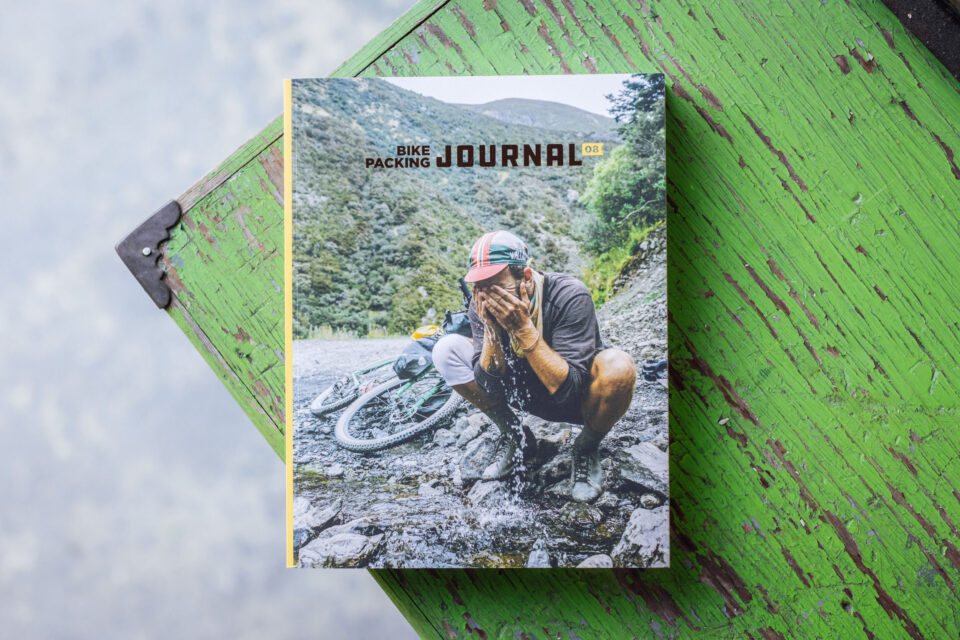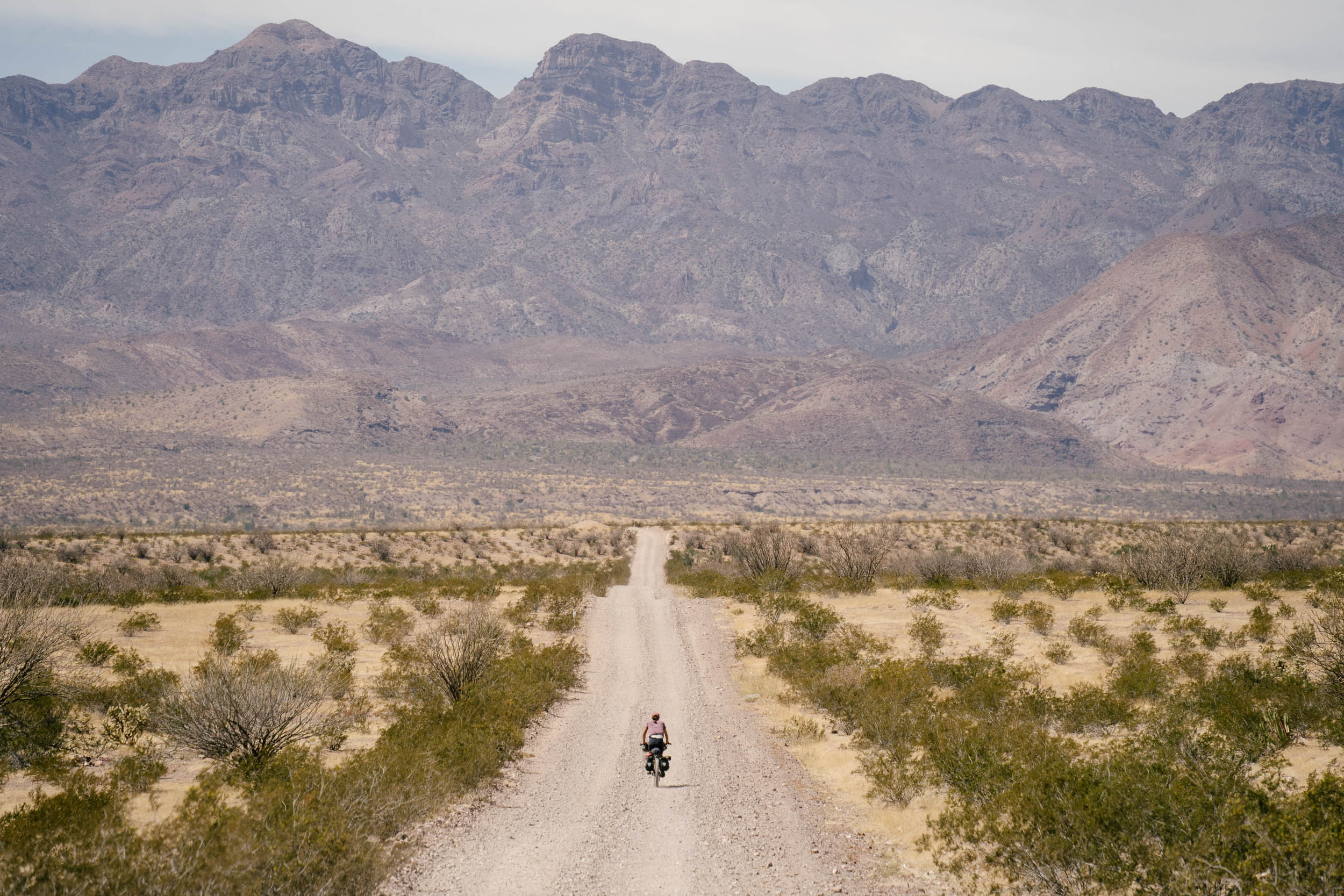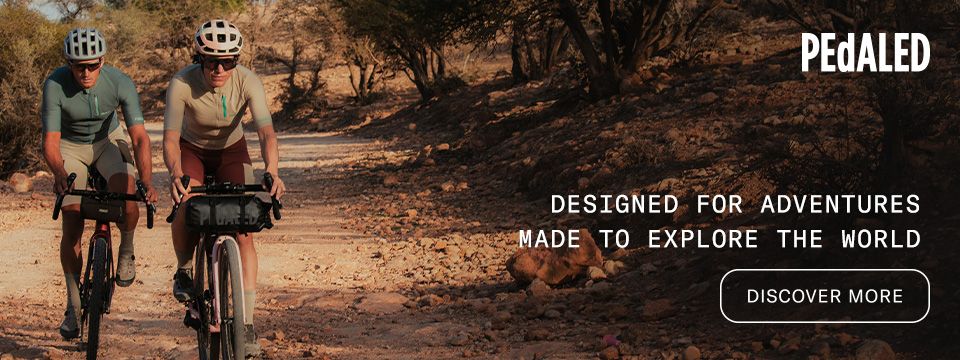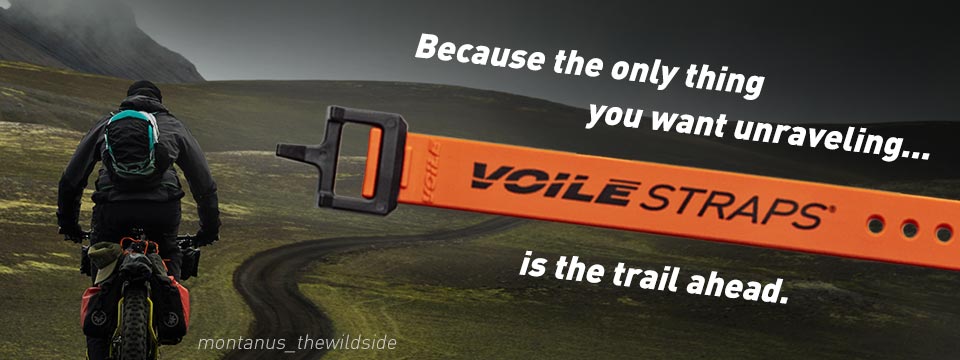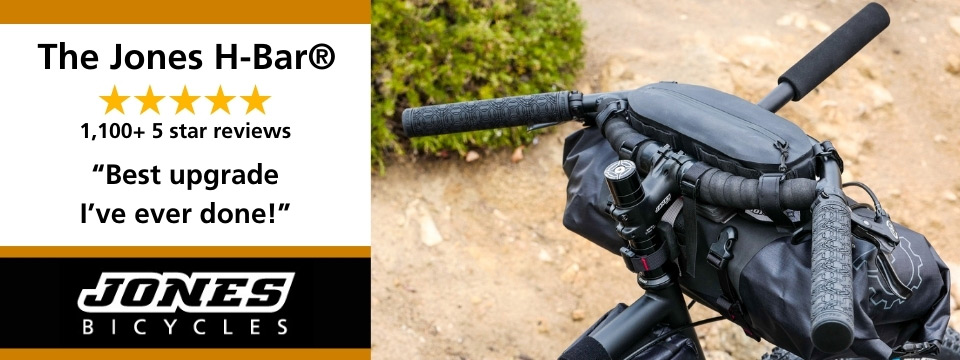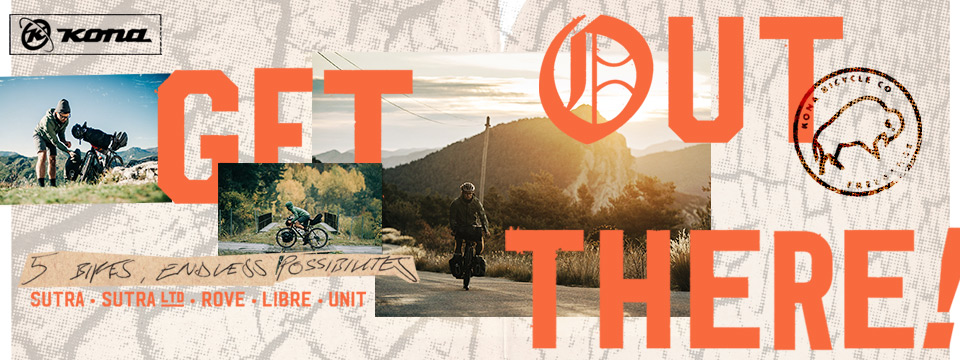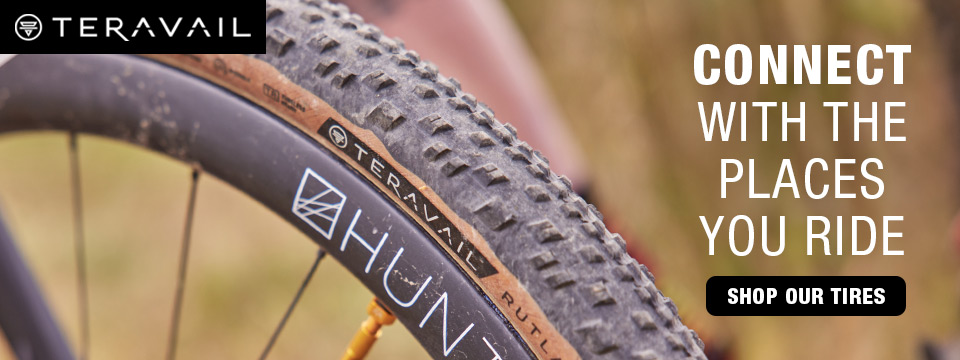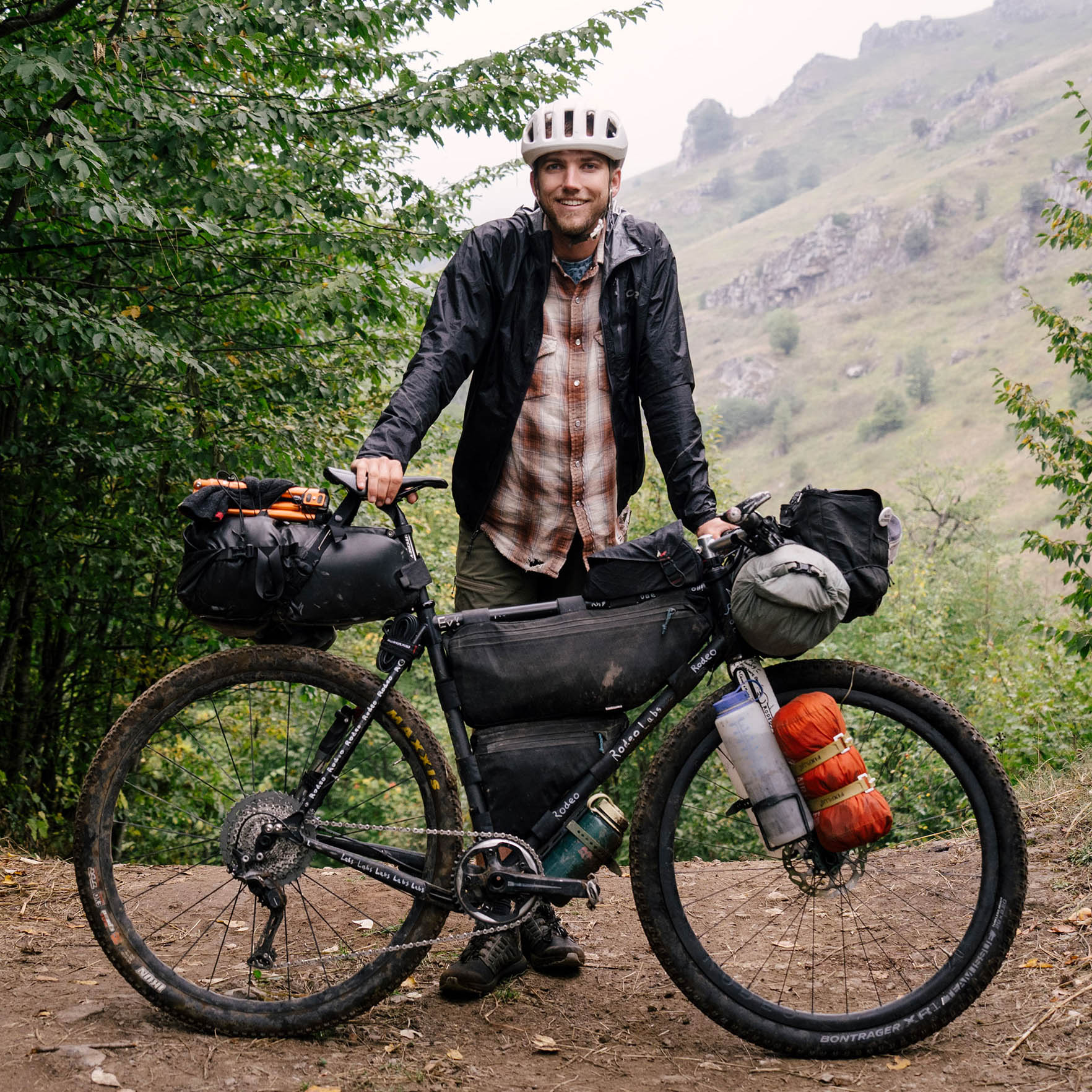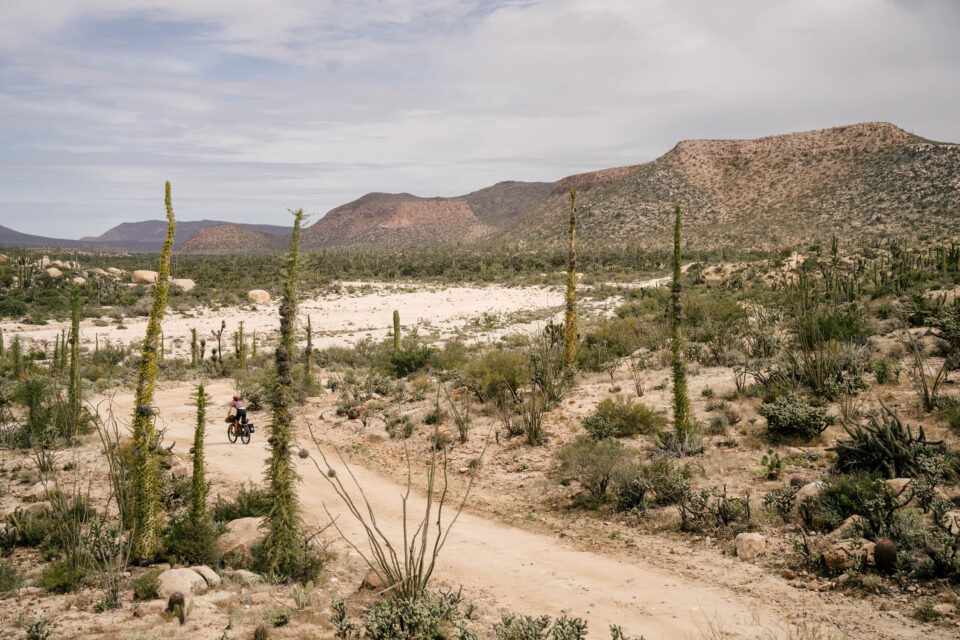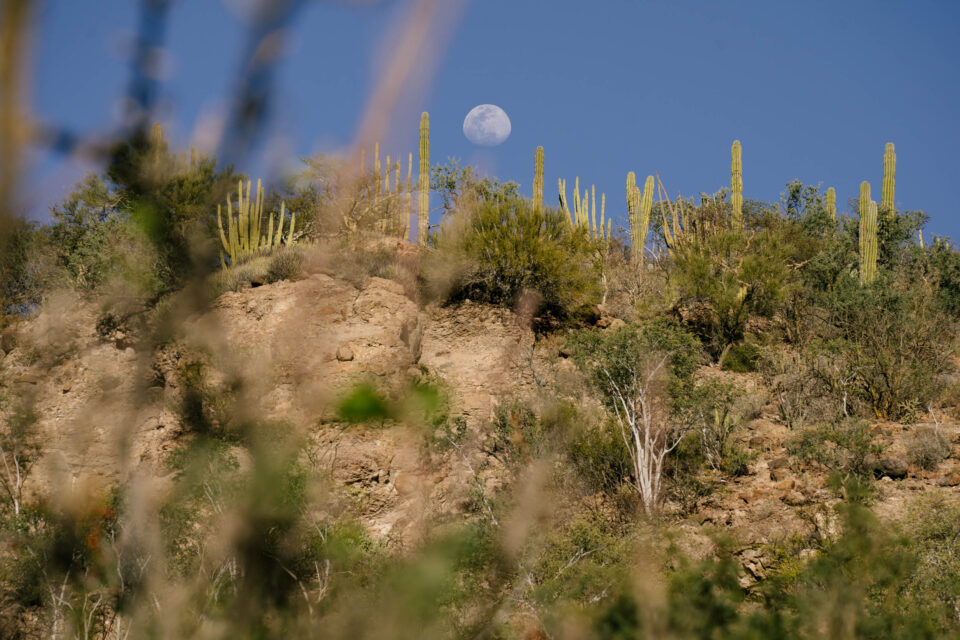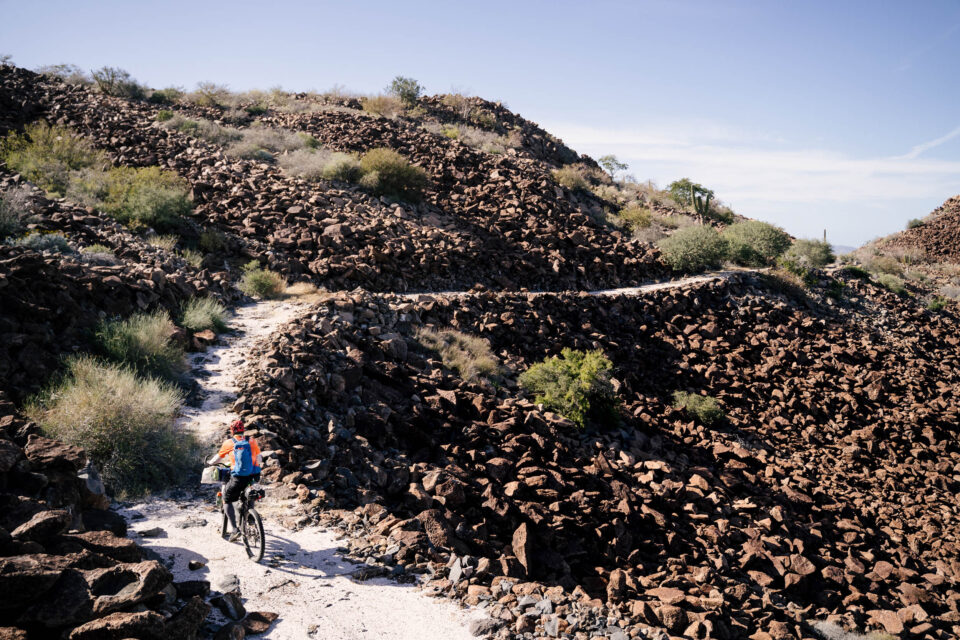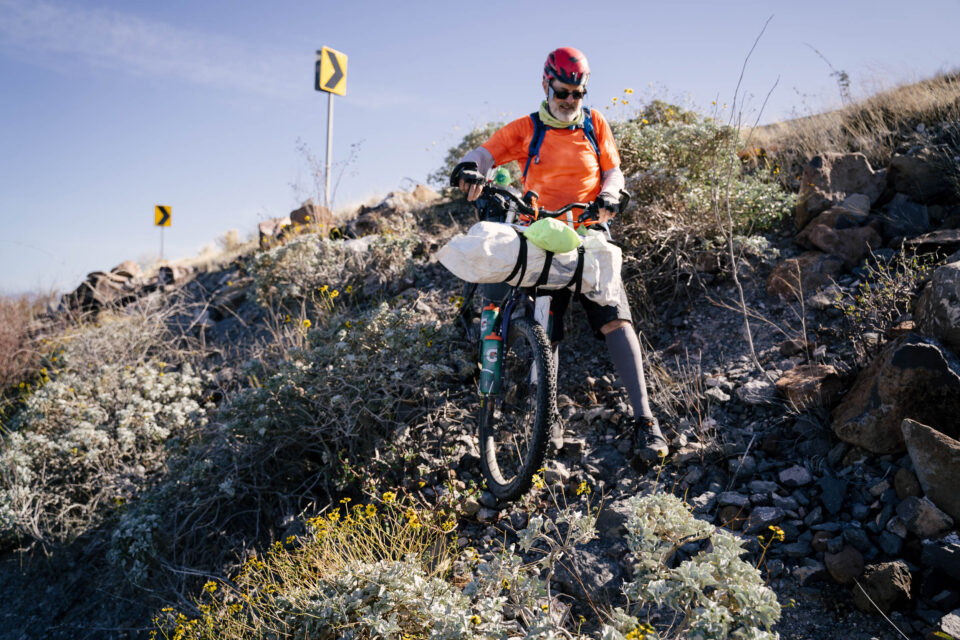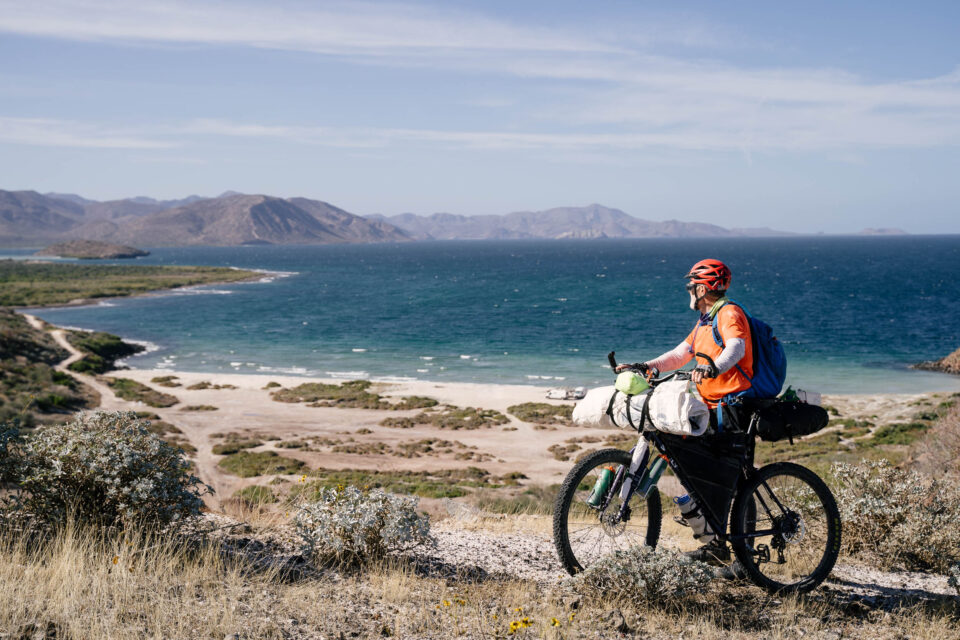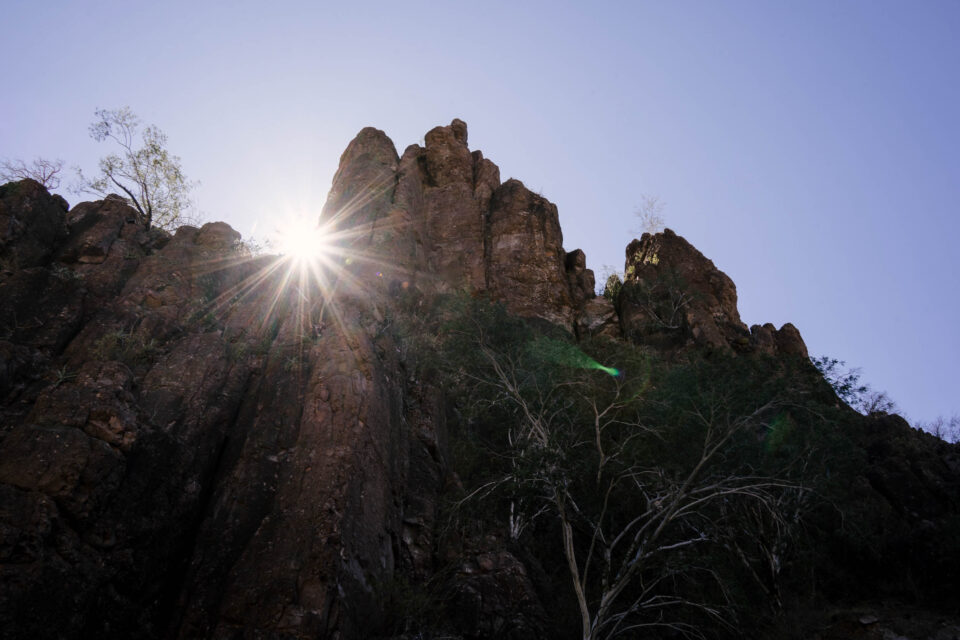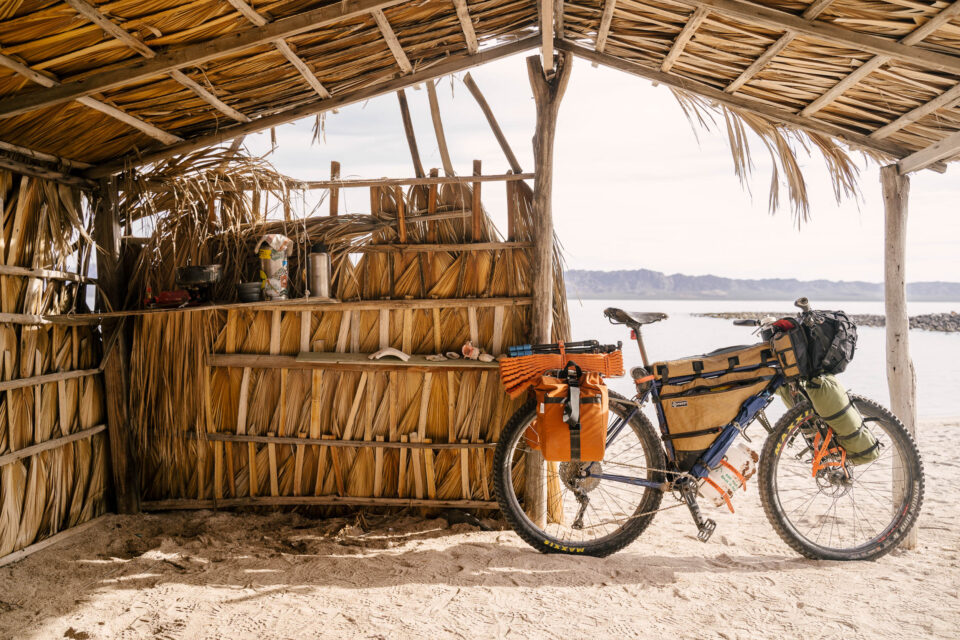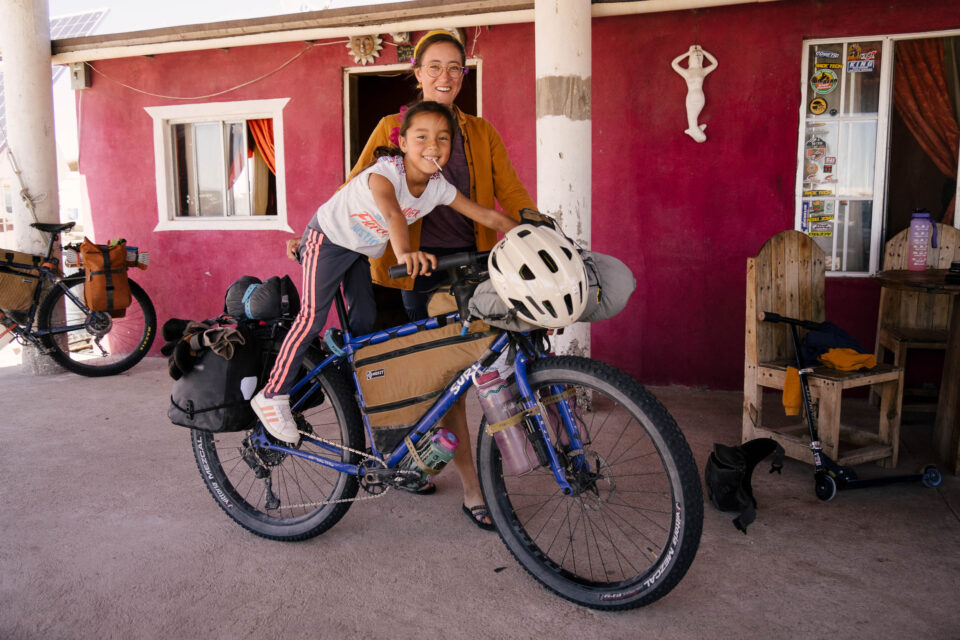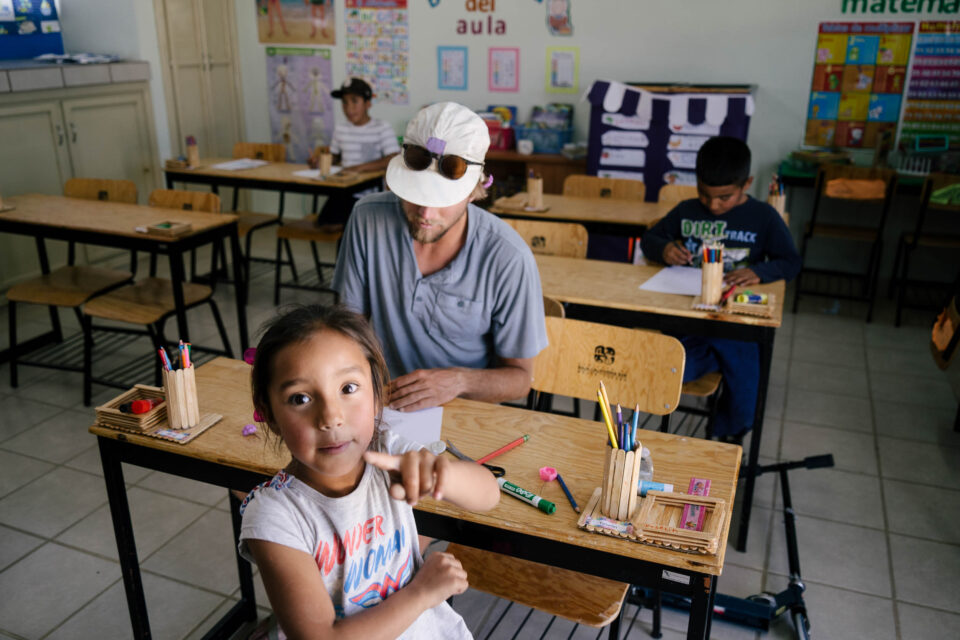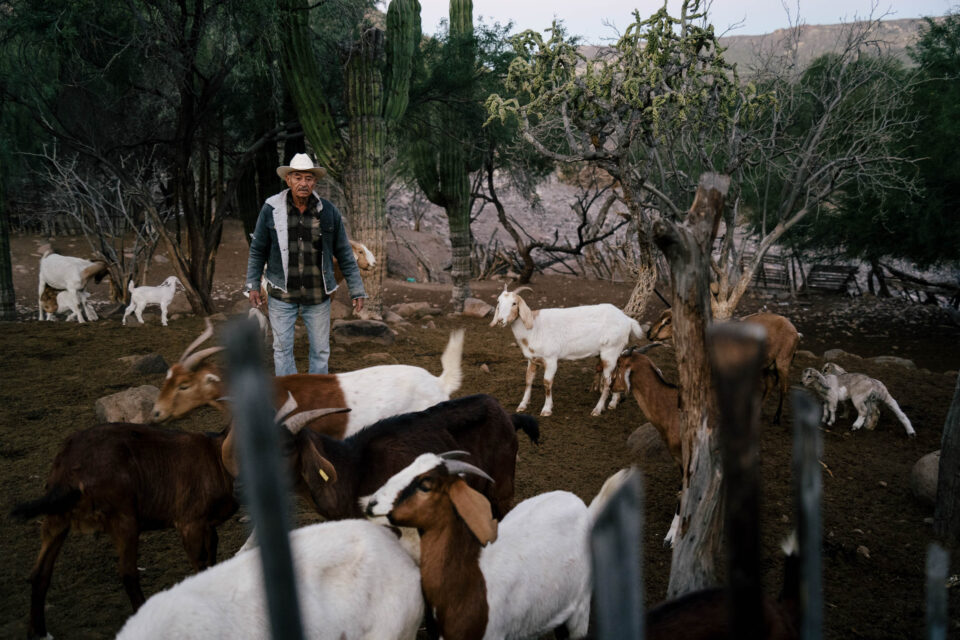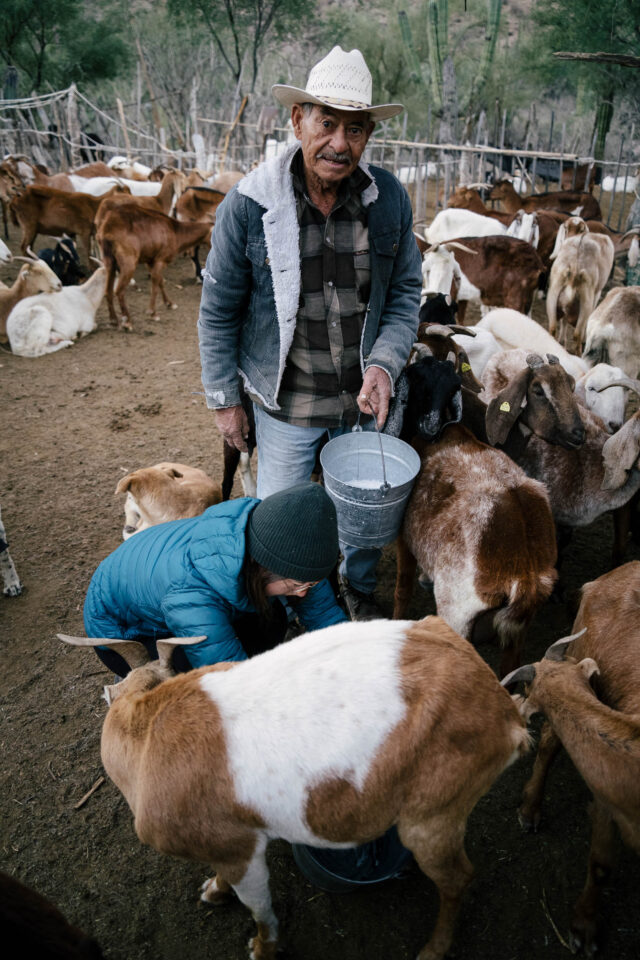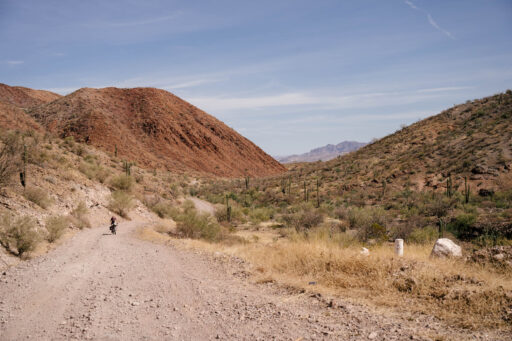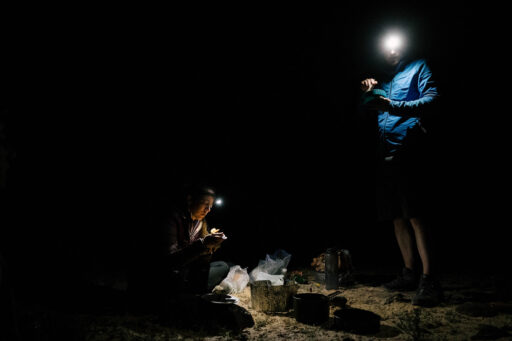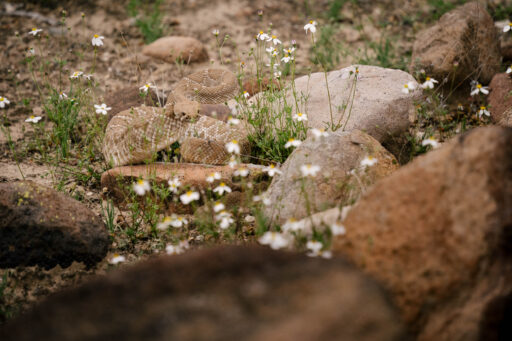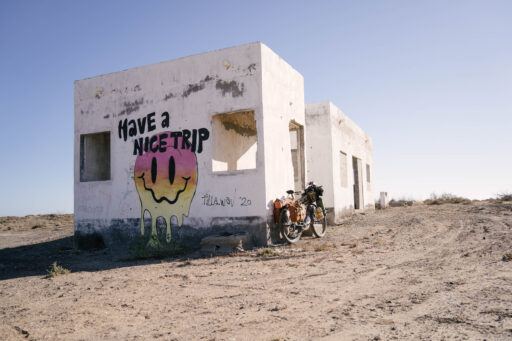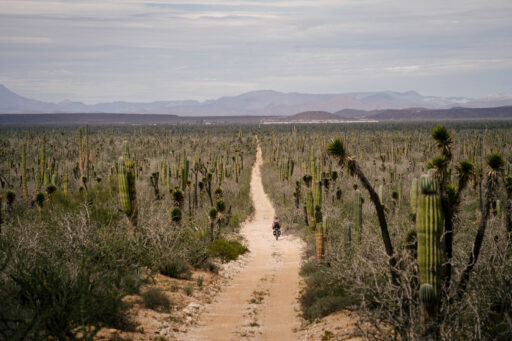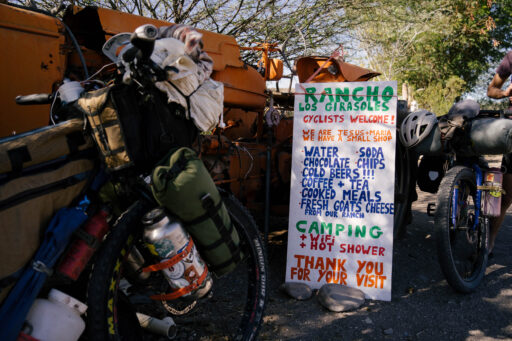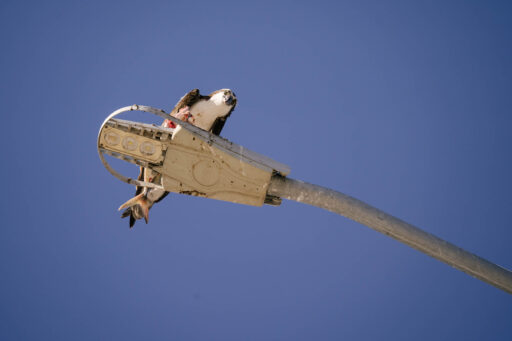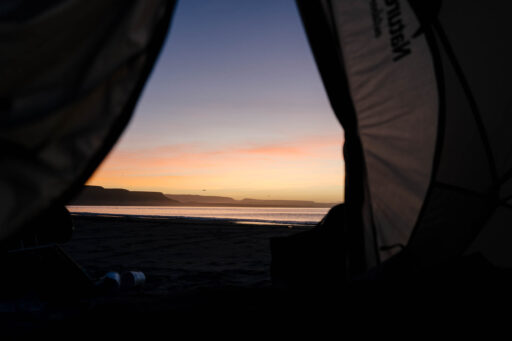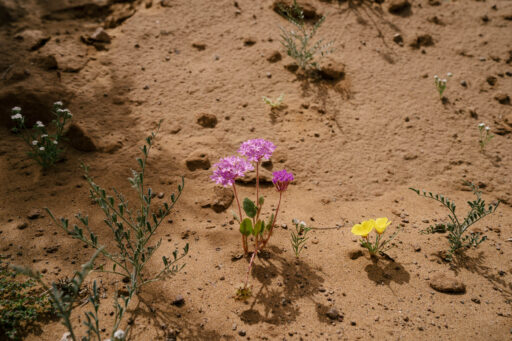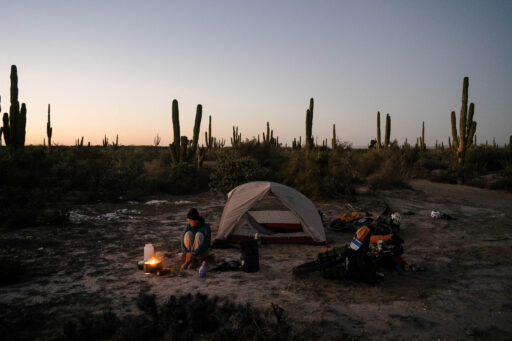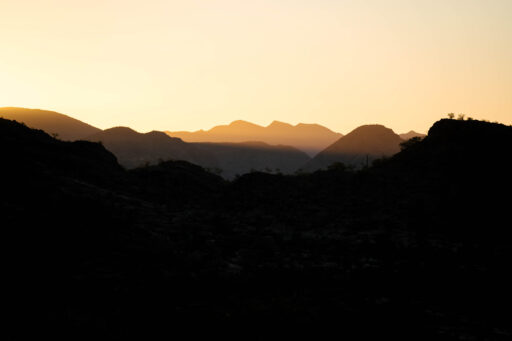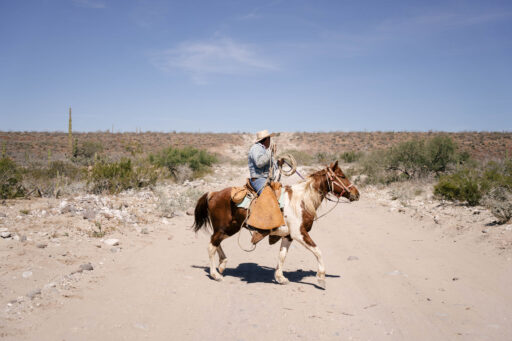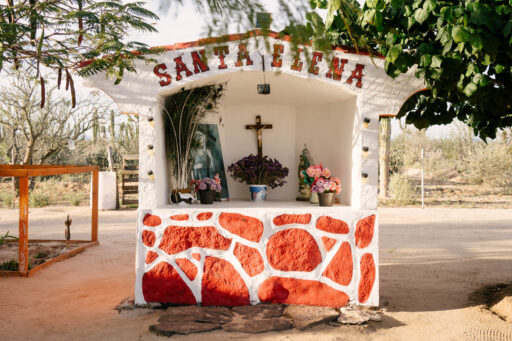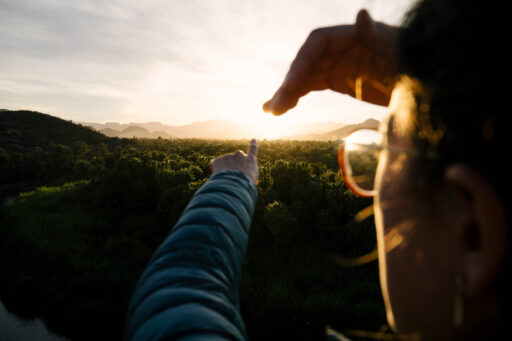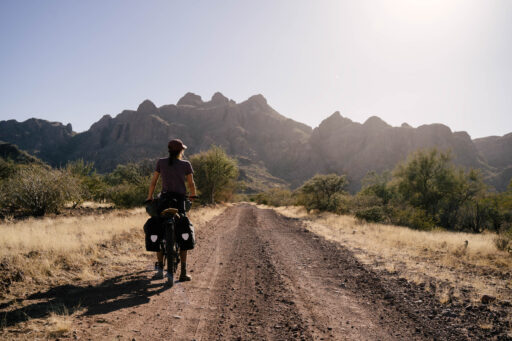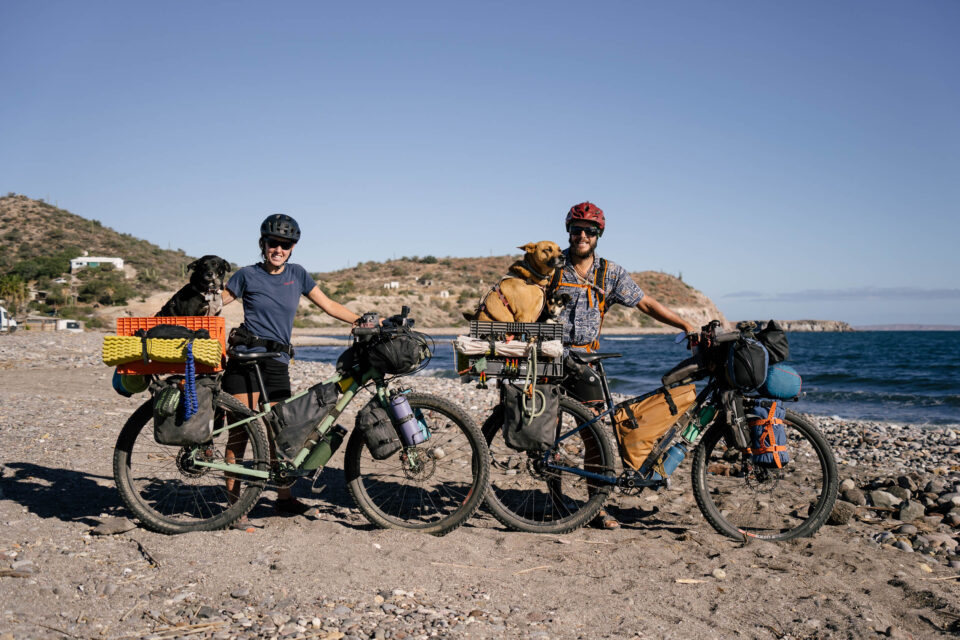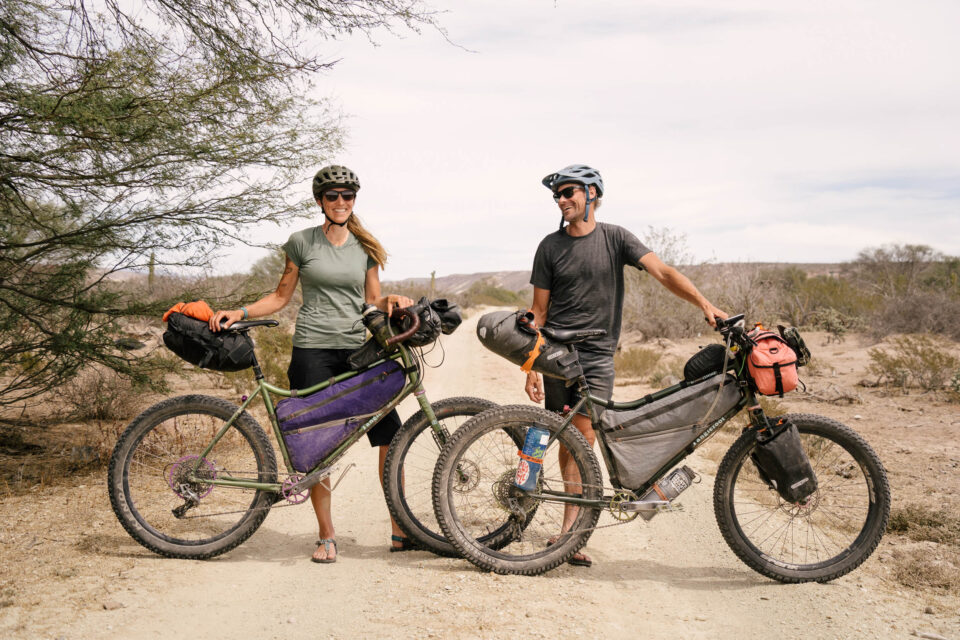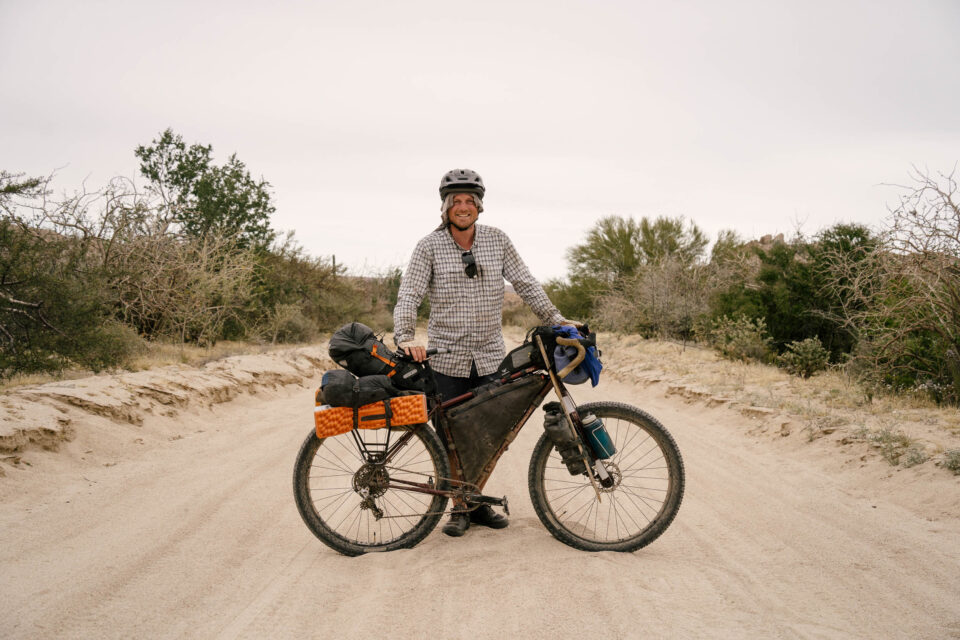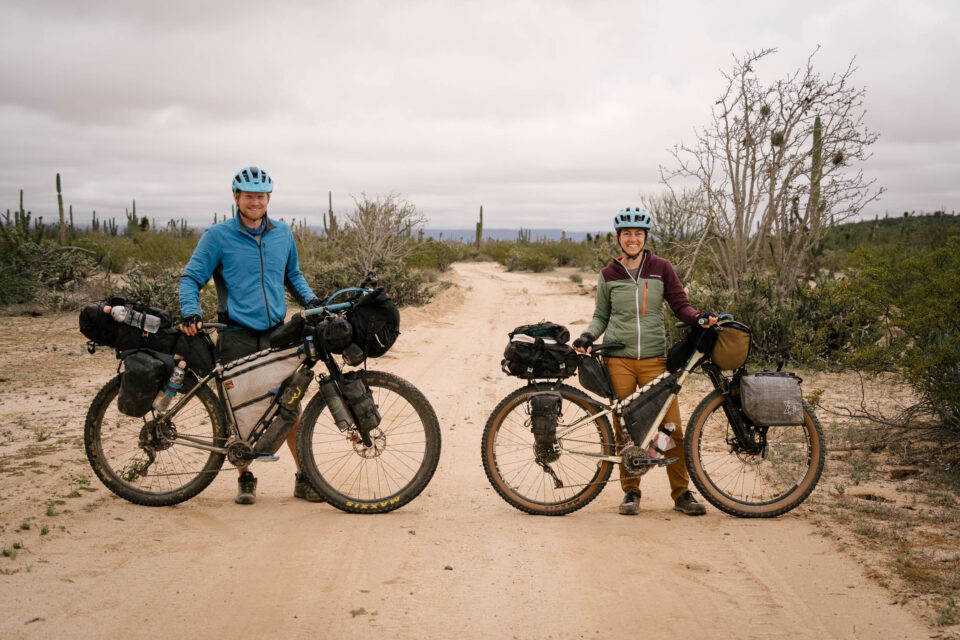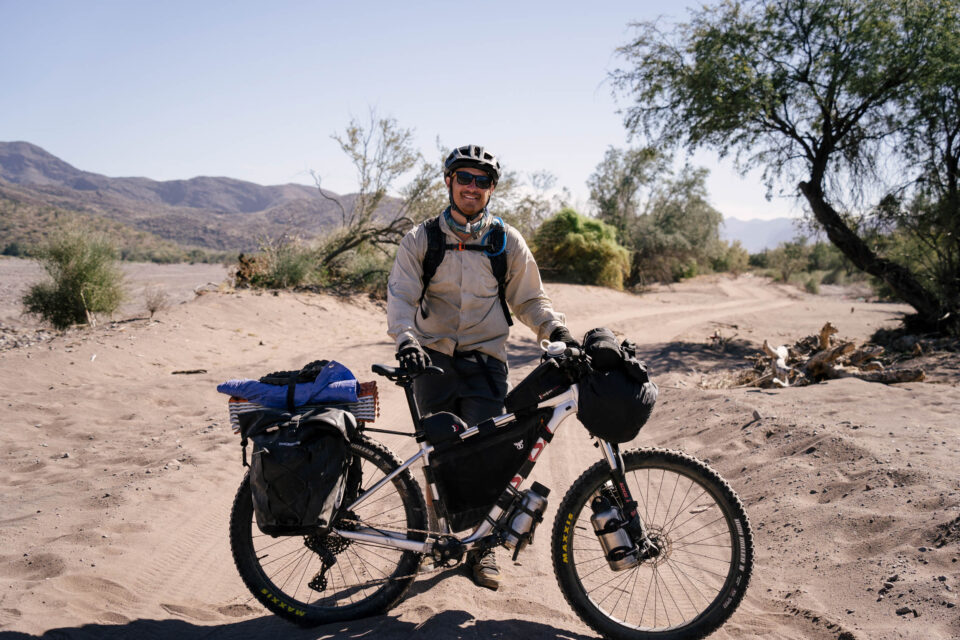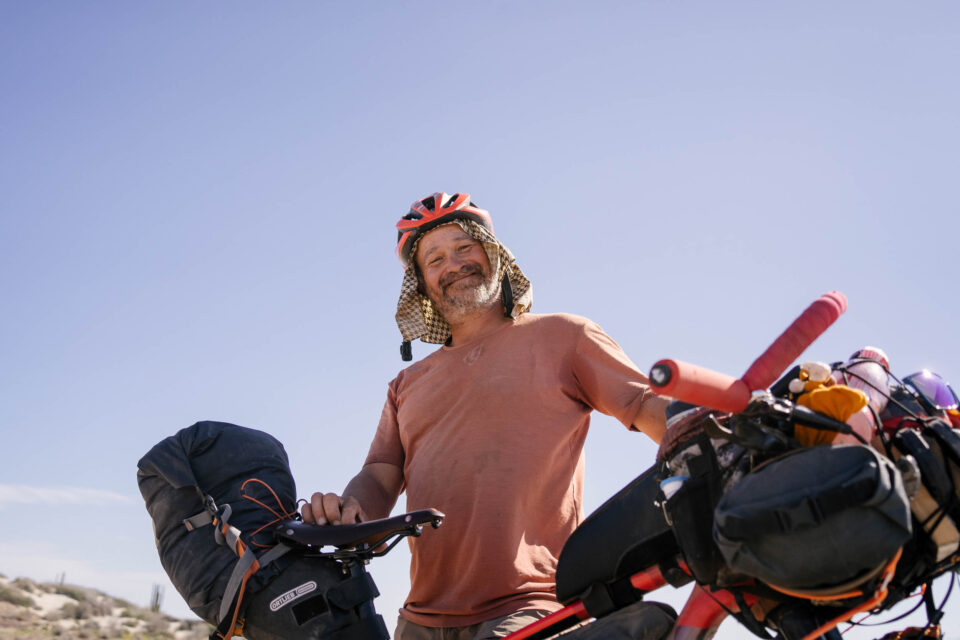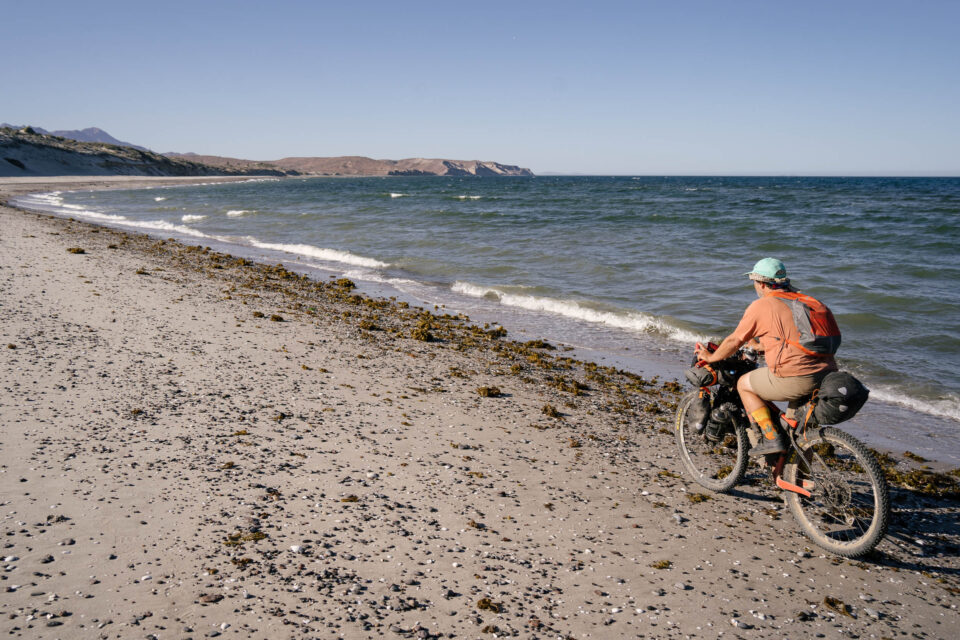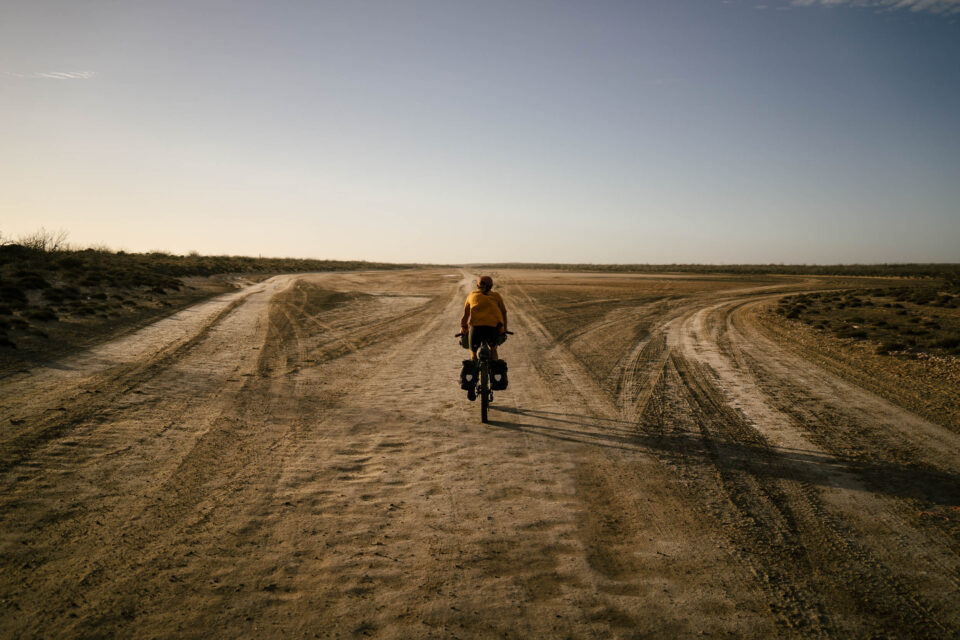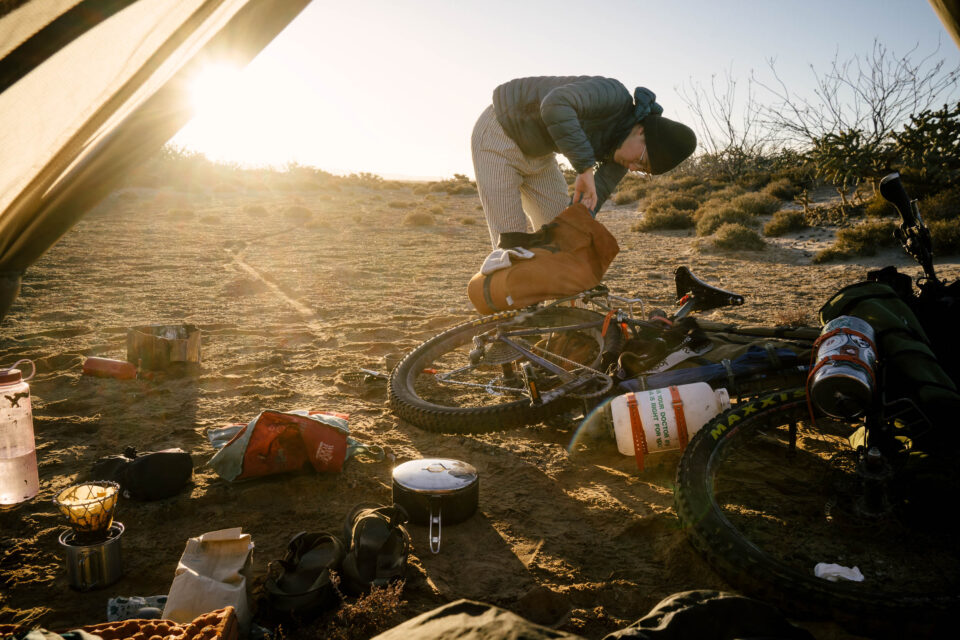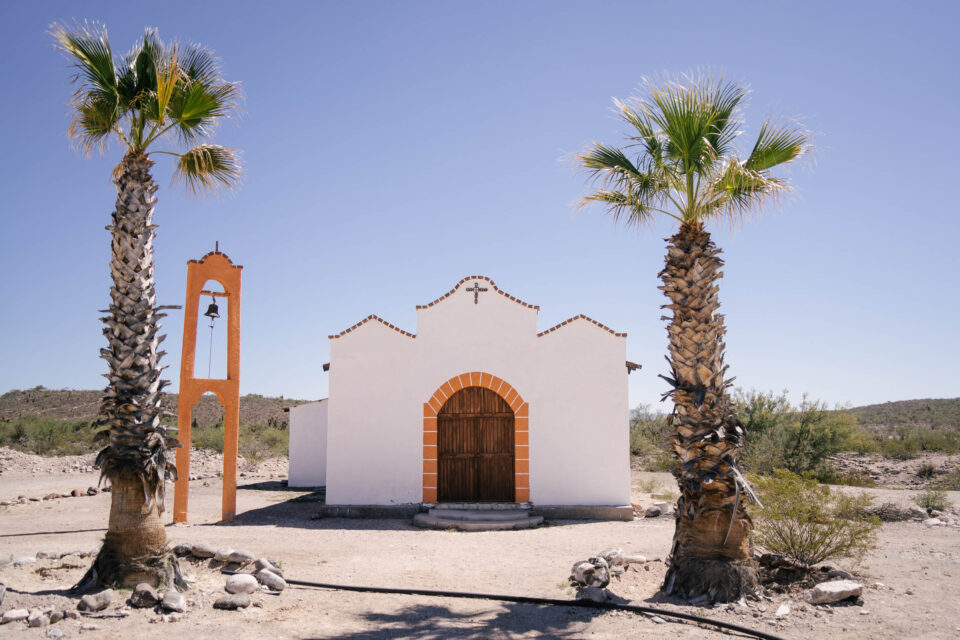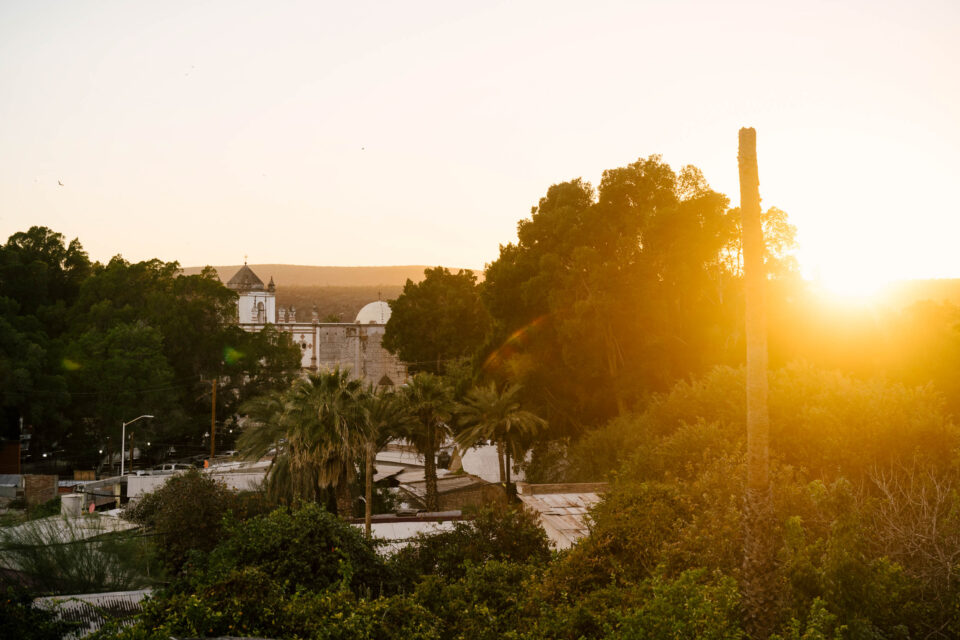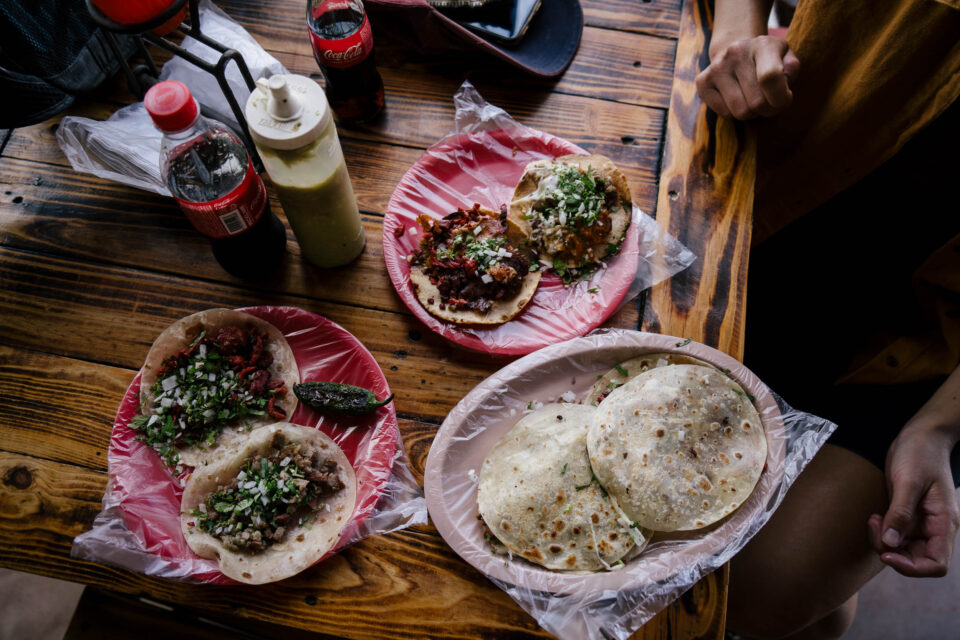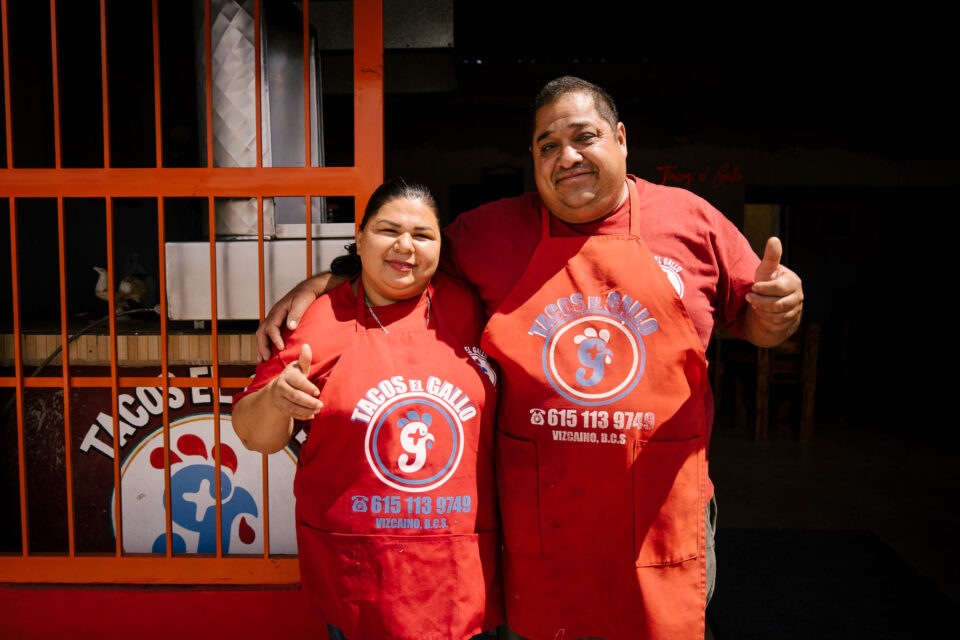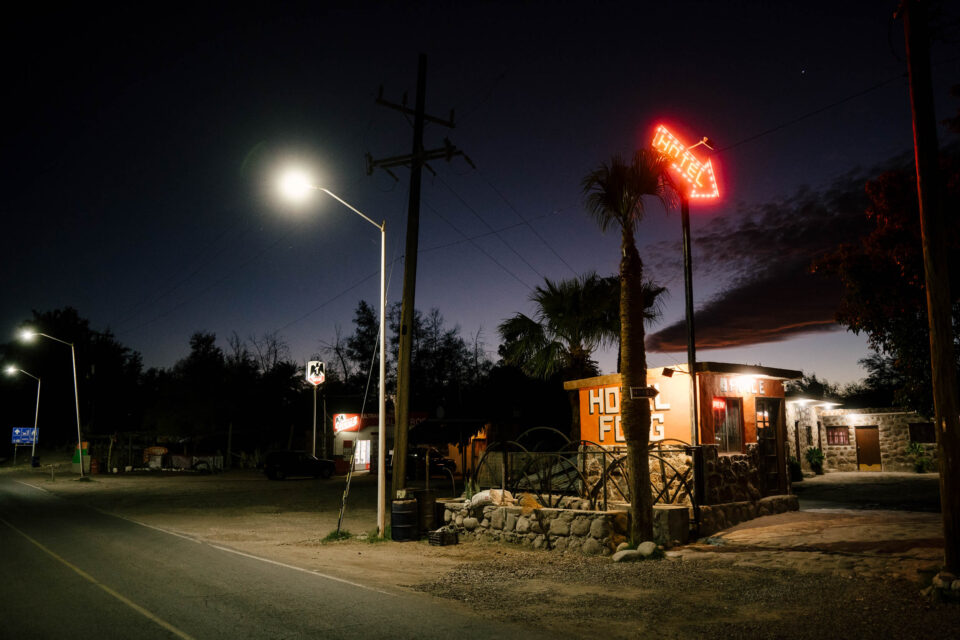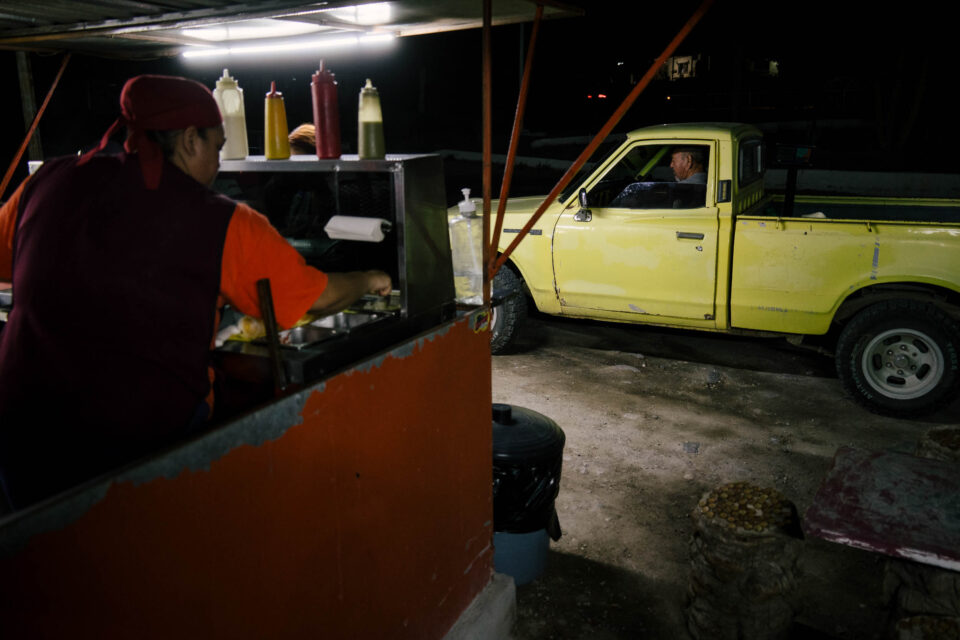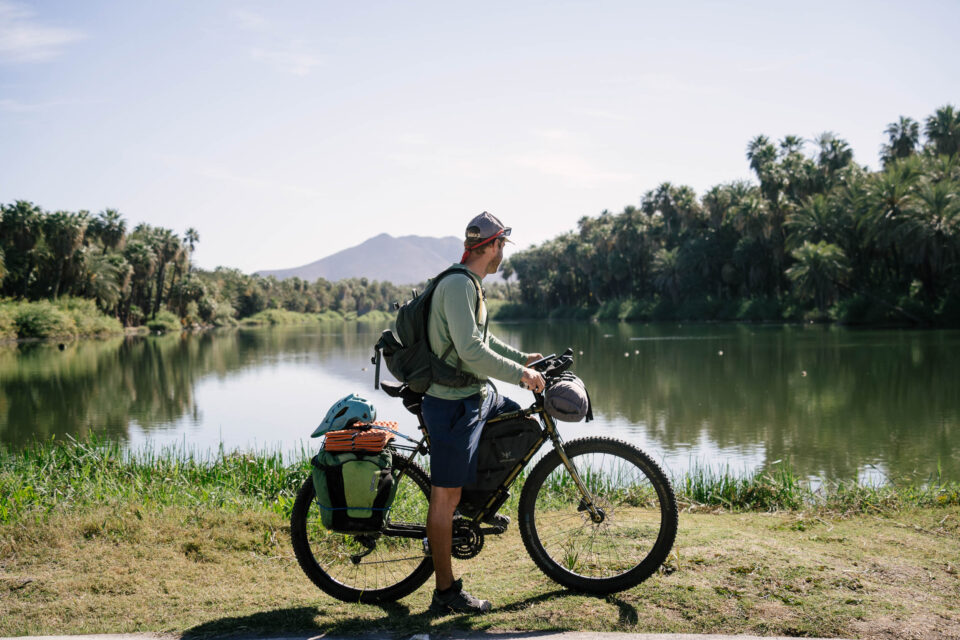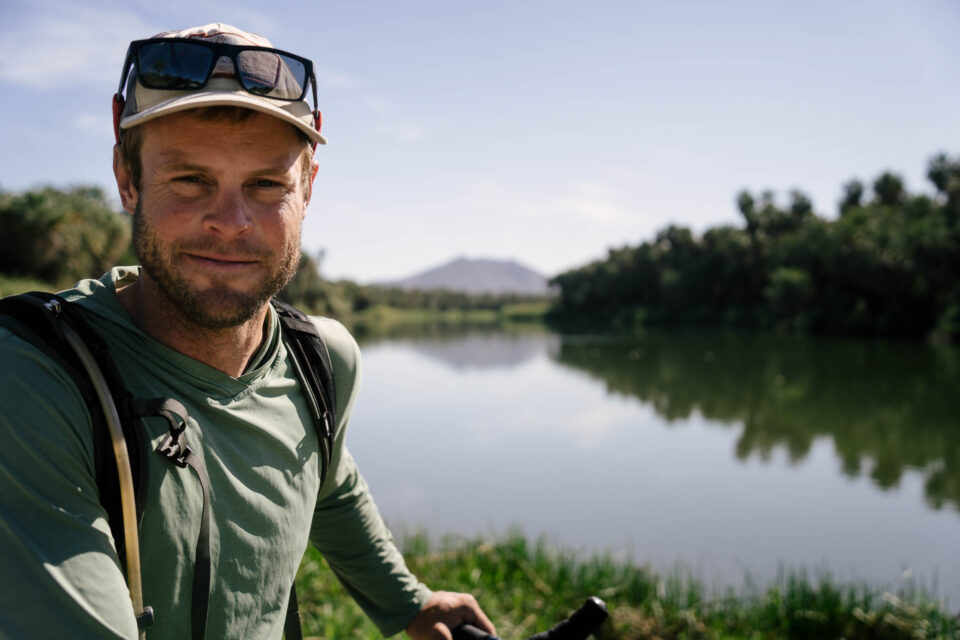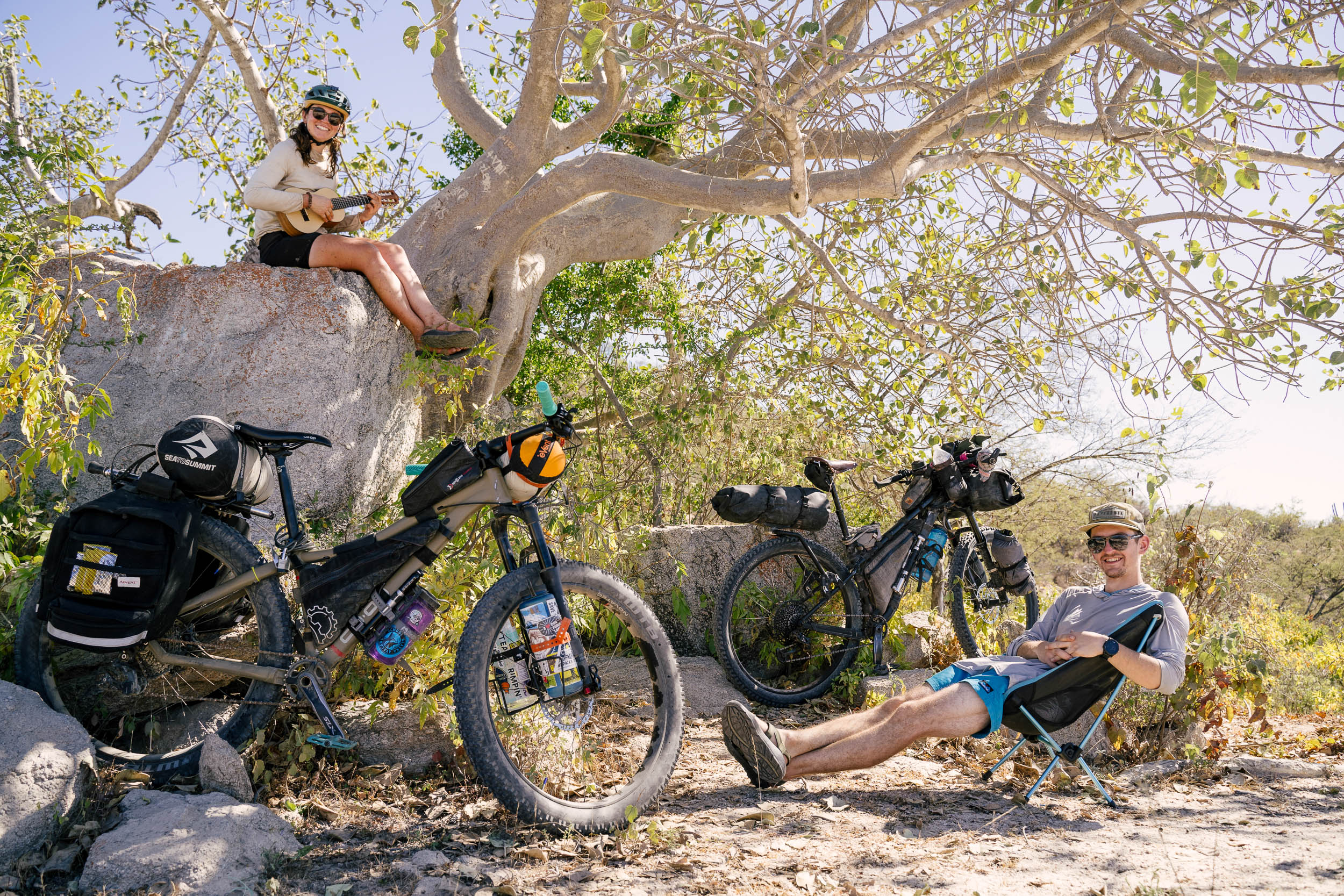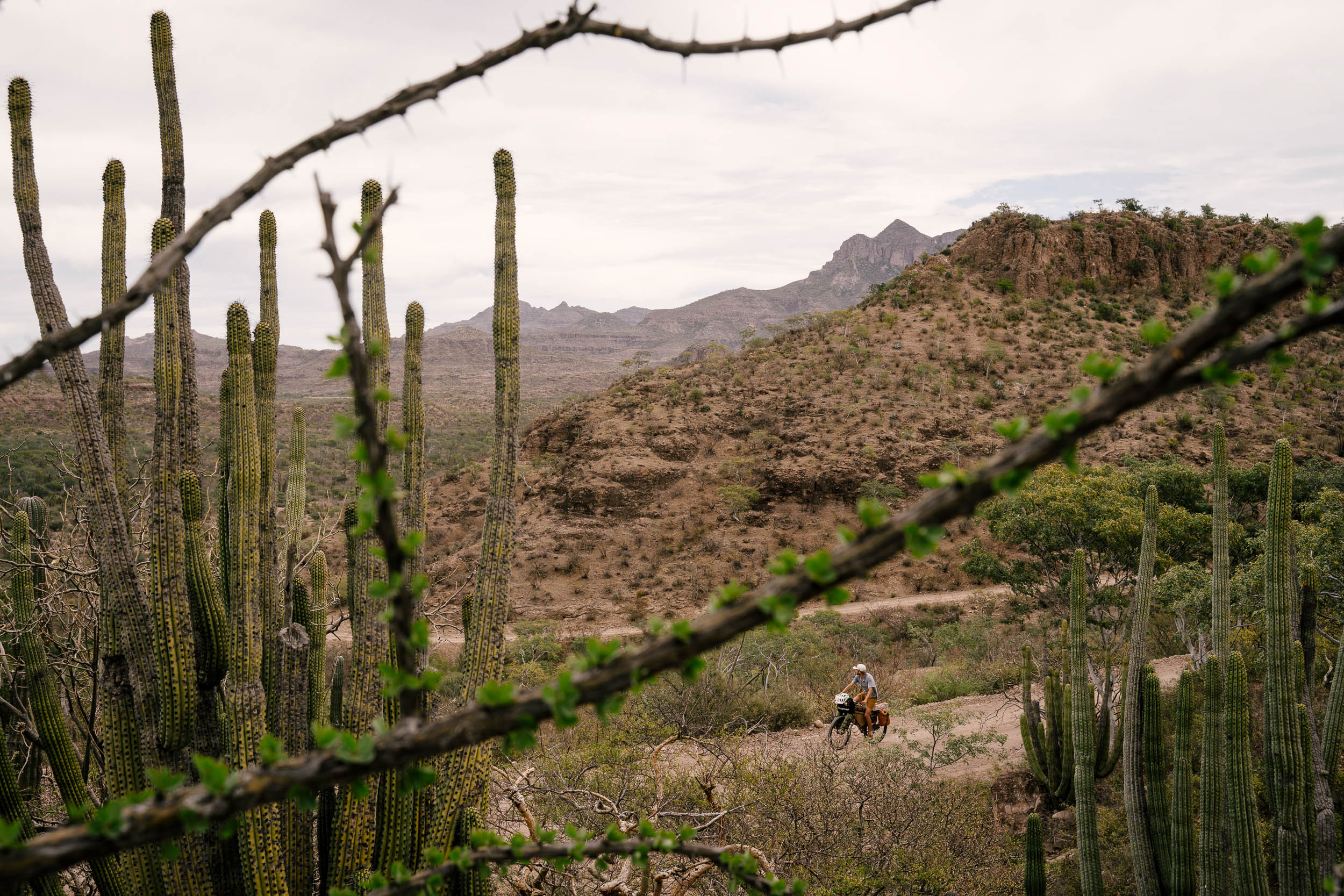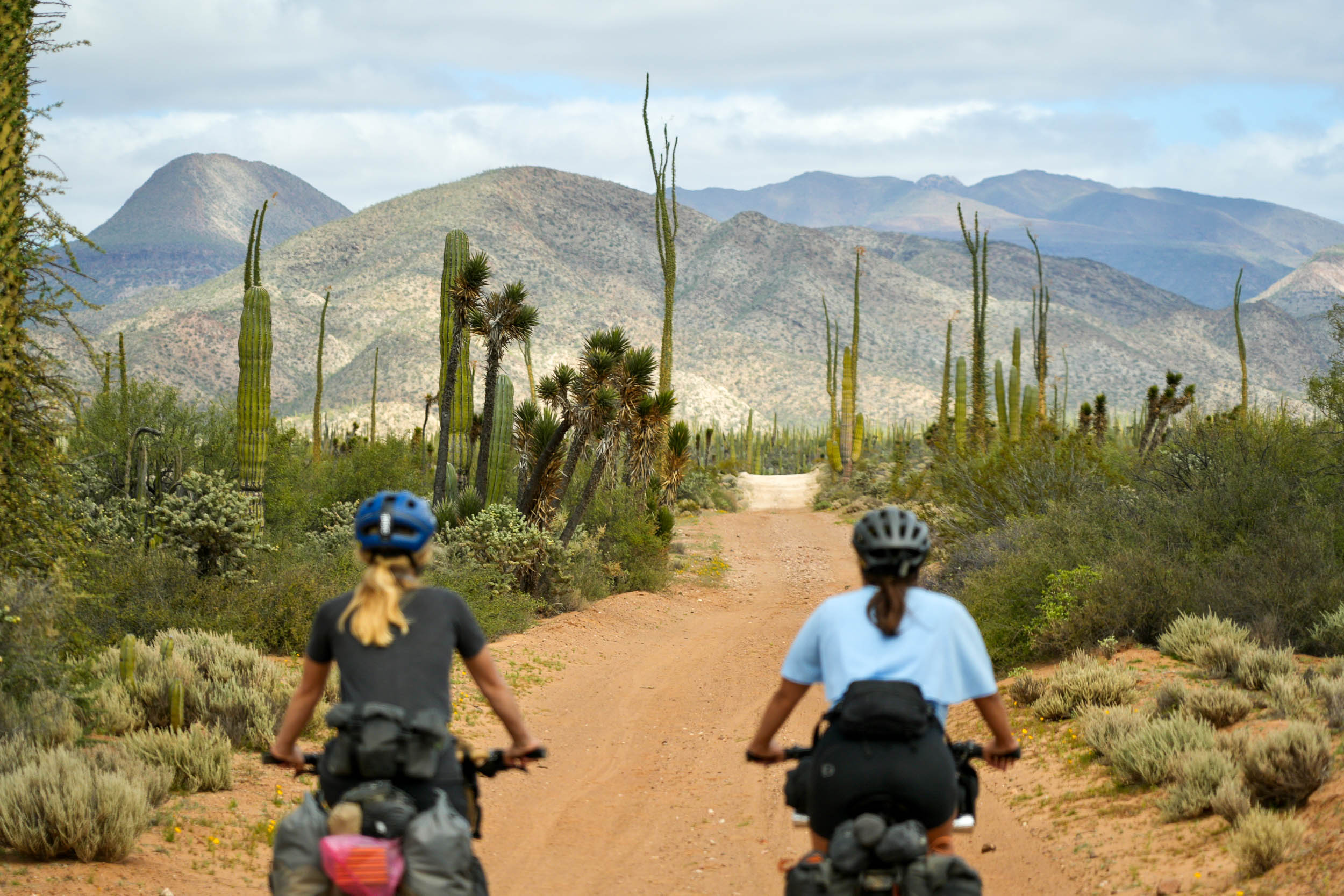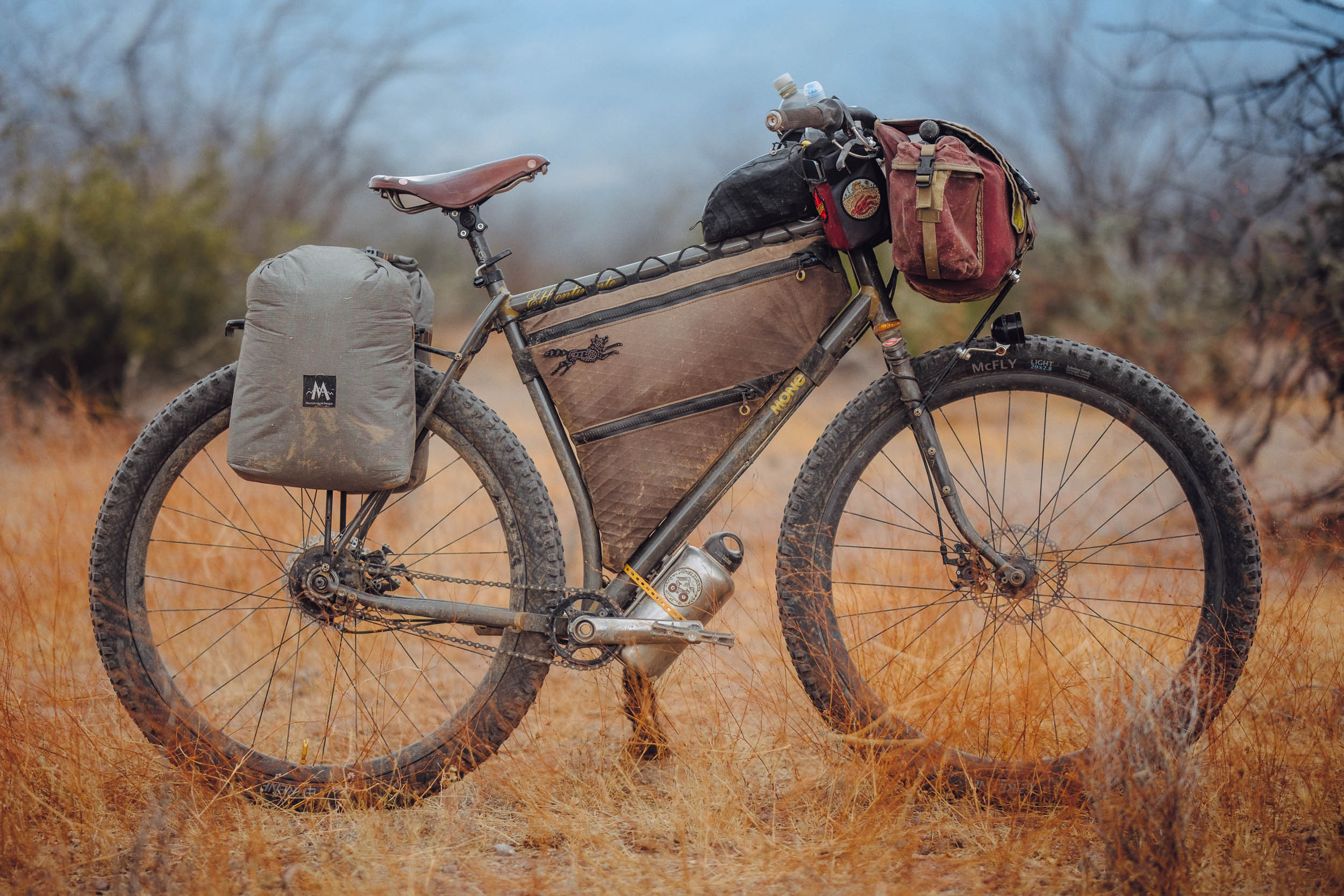Baja Divide Pt. 3: The Desert Surrounds
Share This
Evan Christenson’s third report from the Baja Divide finds him deep in the desert amid a rotating cast of new characters with diverse, unexpected, and occasionally far-fetched stories that brought their paths together in Mexico. Find a staggeringly beautiful gallery of images and a look at the dynamic tapestry of traveling bikepackers and locals that forms along the route here…
The desert surrounds. And, this year, as the grayness lays atop and the sun goes into hiding, we pedal on and on. From town to town, rider to rancher, the desert envelops, the rocks pound, and the silence swallows us whole. In this desert, forever three days from resupply, forever three days from a breakdown, you don’t go anywhere. You pedal, and you pedal, and you merely get smaller. The food is the same. The towns are the same. The heaving pickups, with their cowboy hats and cheeky grins, are all the same. I no longer ride for the act of travel. Rather, I ride aiming to find other people, to listen to their stories, to understand why they are here. The road is quiet now. The riders are trickling down this late in the season. In their absence, I sit in silence, and the desert surrounds even further.
Richard is sitting alone at a restaurant when I ride up. He’s on the phone with his wife, checking in, letting her know that he’s okay. I quickly learn he’s also headed north, so we decide to ride together for a while. It’s rare to go this way. Significantly harder too. Richard sits over his plate of manta ray machaca as the wind chimes shimmer in the breeze. We’re soon pedaling side by side, and the stories start immediately.
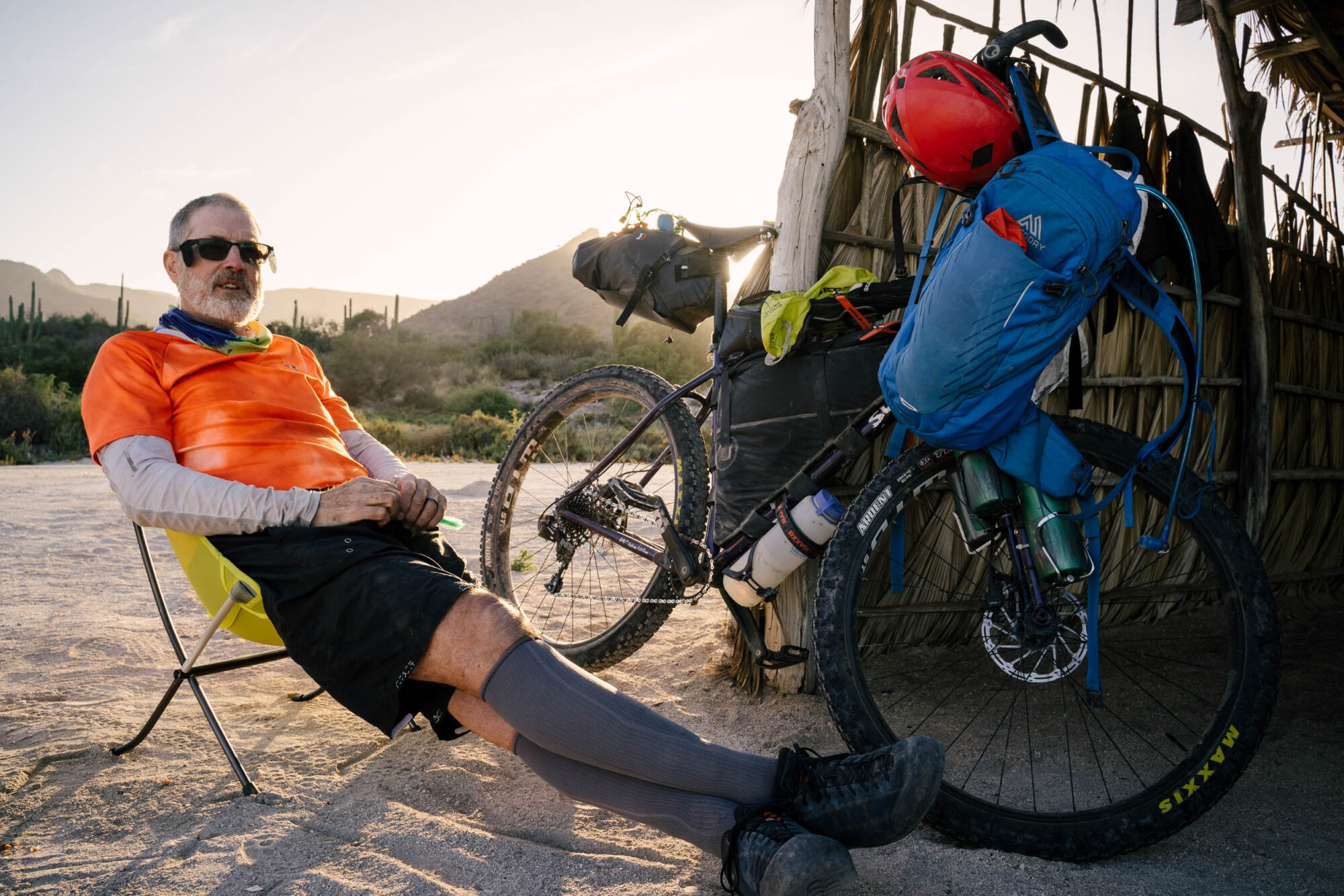
Richard’s 64 years of life are a dizzying mix of accomplishments and wild anecdotes. Richard has given talks at South by Southwest and Columbia University. He has a Wikipedia page. He’s eaten Jungle Tortoise and zebra, hosted Biden and Ted Kennedy for dinner, and lived in remote villages in the Andes. Richard worked as a diplomat for the US Embassy in Ecuador, and more recently, for the International Monetary Fund. He graduated from Stanford in 1981 and moved down to Ecuador, where he worked for the Peace Corps for two years.
Ecuador and the Peace Corps served to define much of Richard’s life. As we ride and camp together, his stories always circle back to the two themes. There, he learned of his own independence and place in the world. He loved the deep dive into the culture and the celebrity status of being the gringo with the Andean mountain accent. He says he would live and think entirely in Spanish and would finally see a photo of himself after six months and be shocked at the gangly figure looking back. Richard adopted the name Ricardo while down in Latin America, the rolled Rs fluttering from his tongue, and says that in Spanish, he’s more confident, more open, and less reserved than the awkward, self-conscious Richard from Oregon.
Ricardo and I ride on, occasionally singling up for the passing semis. He’s fit, pedaling comfortably, and he towers over me as we ride up Highway 1. The Baja Divide is his first time on a mountain bike, and he’s done his best to replicate his position from his Novara touring bike back home. Richard soft retired a couple of years ago and, as usual, went looking for new things to do. He tried it all, bike touring included. “I went skydiving. I went bungee jumping. I thought bike touring would be like that. But I got home after my first tour, and that winter, I kept finding myself Google Street-viewing the roads I had ridden, and I thought to myself, ‘This is pathetic, Richard!’ Why live in old memories when you can go make new ones? So, I went bike touring again.”
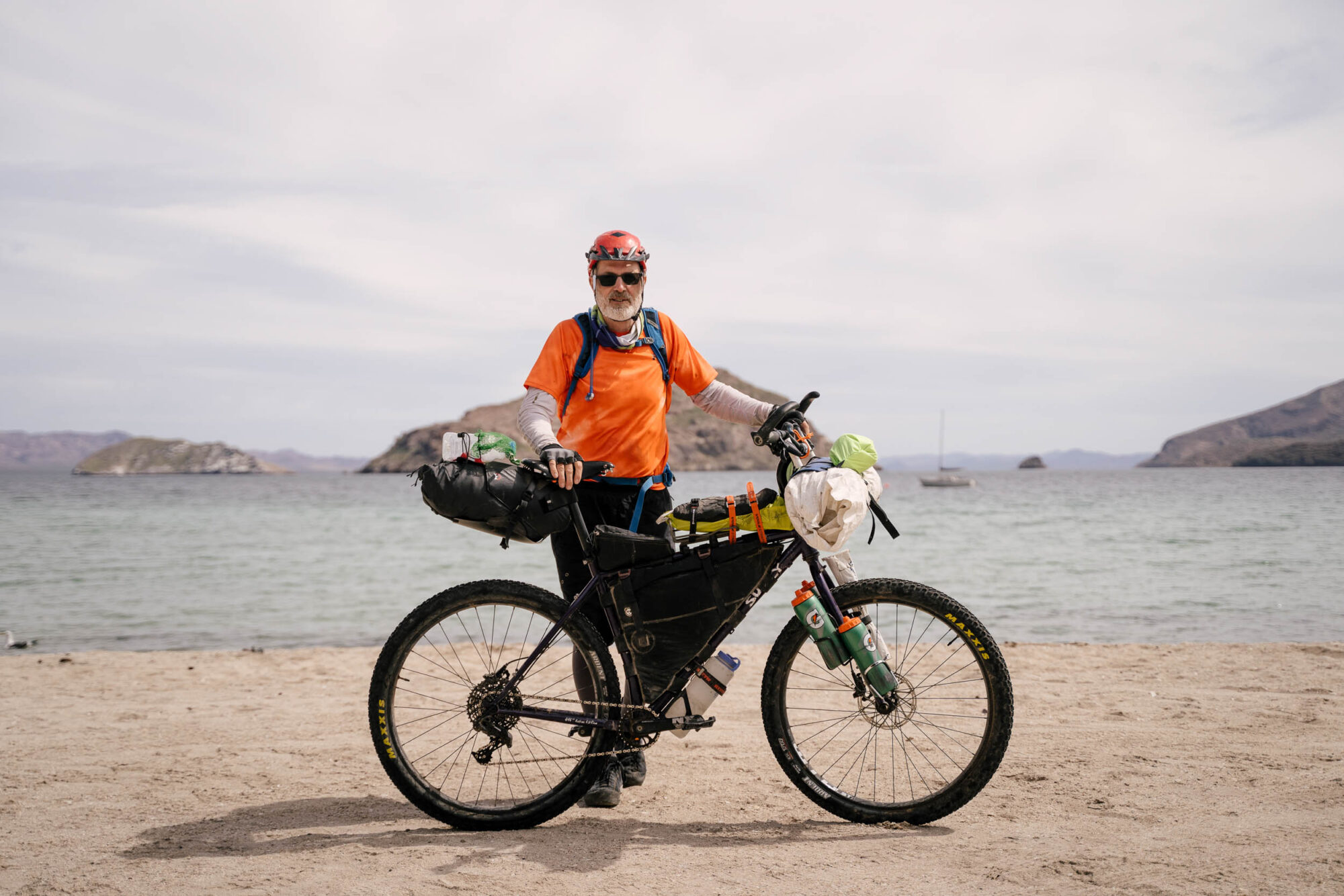
He has now ridden across the US three times, and the Baja Divide is serving as an extension of that. Bikepacking seems to be that natural extension to so many previous bike tourers who are looking for a bit more. He bought a Surly Krampus and came down here to escape the harsh winter back in Washington, DC. Another semi buzzes us as we ride on, and I ask him if it’s weird for someone highly accomplished like himself to be here on the side of a Mexican highway, getting buzzed by semi trucks and sleeping in the dirt. He sits with my question, thinking for a while, and shares some thoughts about embracing life on the bike and the position it puts you in.
Richard tells more stories around the fire, and I slot in a couple of my own as they fit. He’s traveling light, with no stove, and I make him some food in the evening and hot coffee in the morning, and we ride off for a few more hours together. I find him inspiring. The depth of his stories are astounding, from helping a man out of poverty who ultimately became the president of Ecuador to living in board shorts on the beach running a shrimp hatchery. Richard’s been having trouble with his son, who’s my age, and I’ve been having increasing problems with my father, who is around Richard’s age.
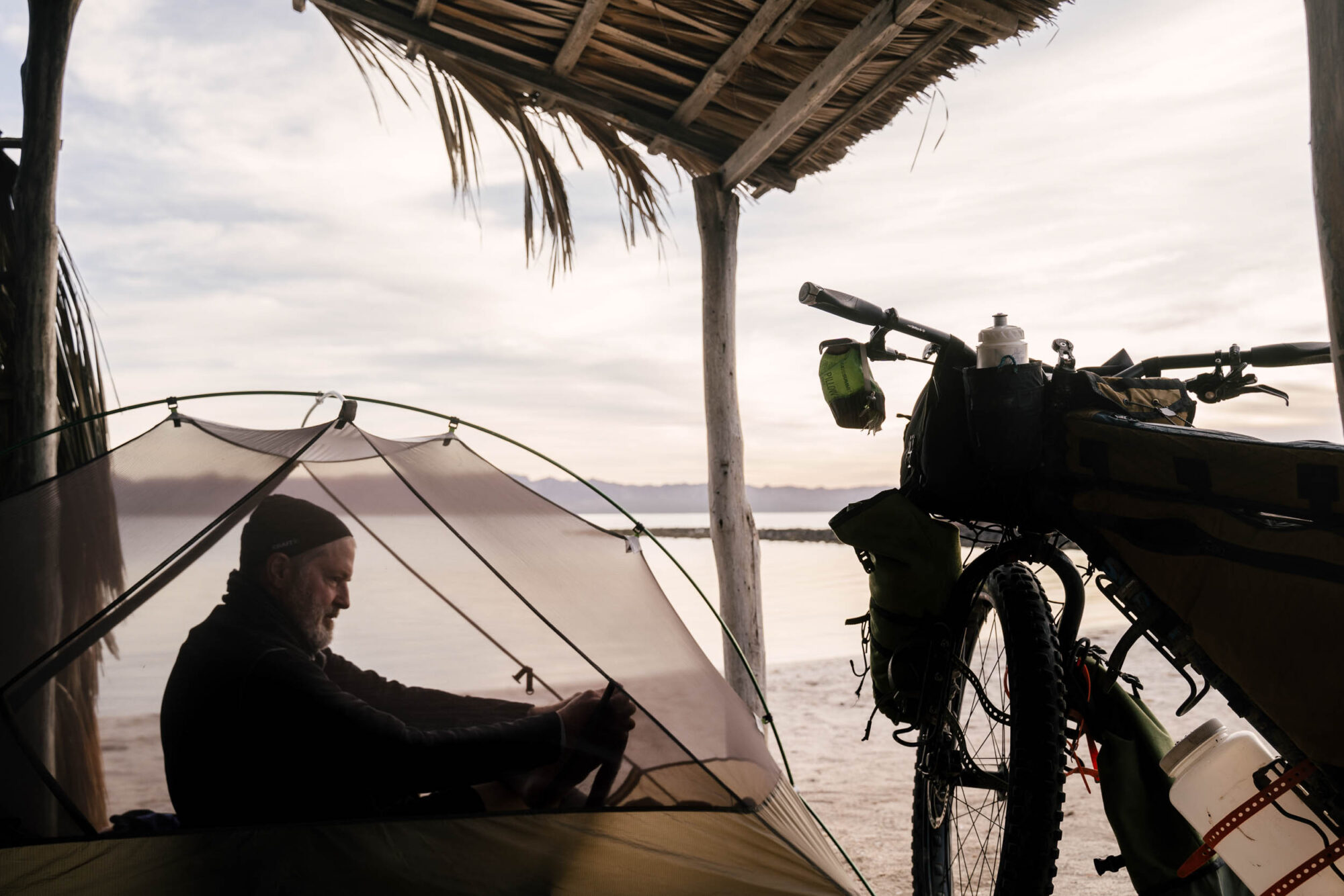
As we ride down the highway together, a simple act I’ve shared with thousands of people by now, but never with my father, and him never with his son, I ask what his life advice is for someone like me. He starts into a deep story, once again reflecting on those formative years in Ecuador, and tells of living in villages worlds away from life in suburban Oregon. He knows nothing is the same since, in his life and maybe in his host family’s too. He looks down at me as we ride, and he says, “What you think is important often isn’t. And what really is important, you might not even know.”
I try to give Richard a handshake as we say goodbye, and he drops his bike and gives me a hug before pedaling away. My girlfriend Bo flies in and joins for a couple of weeks on the route, and Richard’s words ring through my ears the entire time. I wonder what our impact will be on the world around us as we ride through these rural villages of Baja, good or bad.
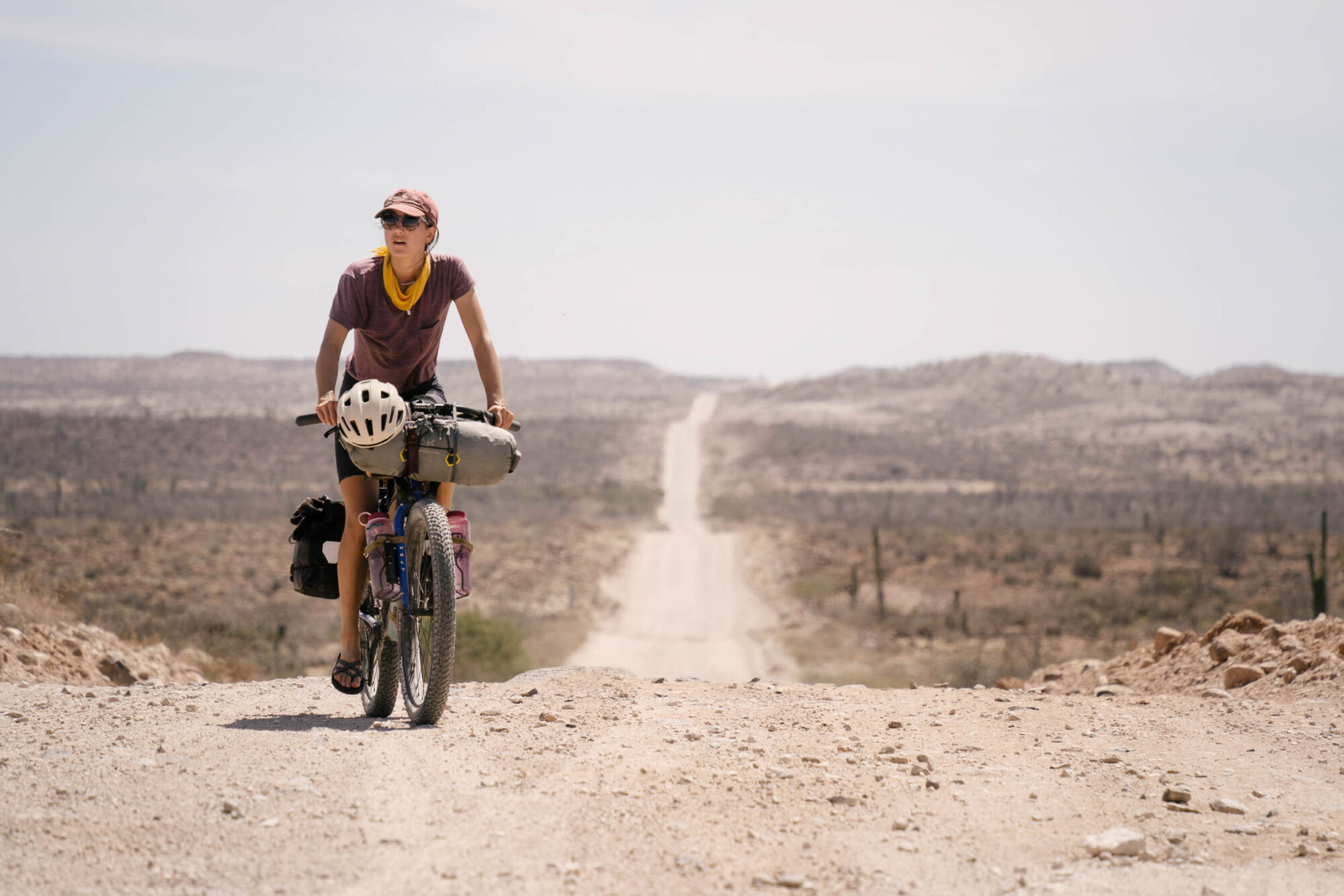
Bo and I ride on. We climb back into the canyons, and after a few long days of riding, we poke around Gaia, looking for a place to camp. I come across a public pin only five kilometers up the road. Rancho with food, wifi, place to overnight. We decide to push on, lured by the thought of warm food, and we show up at sunset. The ranch is situated amid a small nook in the great canyon walls, and the sun eagerly juts across the face just before it fades with abandon.
The goats are bleating, and Rosalina stands atop the hill and waves us in just as Carmelo is returning with his horse. He shakes my hand eagerly and immediately asks us to get on his horse, and we galavant around his property. Carmelo knows what cyclists want by now. They’ve hosted dozens of us at their ranch, and the horse bit is just another thread in the blanket of charm they lay atop the riders.
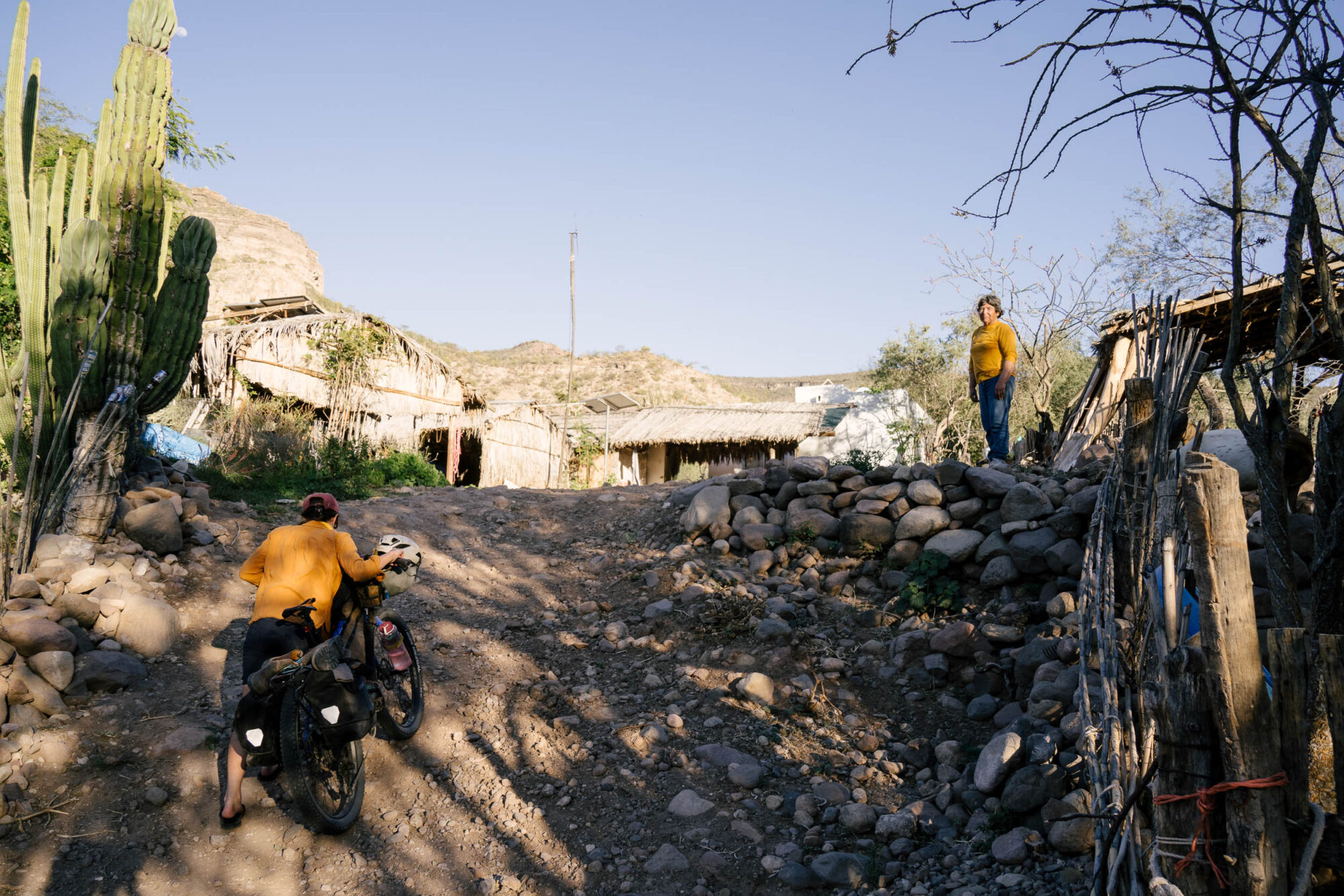
Carmelo washes up and changes from his working hat to his nice hat, and we sit around for dinner. The small USB radio comes out, and we listen to ranchero music, eat fresh goat cheese and beans on tortillas, and talk. Carmelo and Rosalina have been living in this canyon for 50 years now. They come from this canyon, Carmelo’s whole family is from the same one, and the couple met because they were both young, single, and in effect, neighbors. Their marriage was almost inevitable.
Today, they operate a small goat farm together, making goat cheese and selling it in a market in the city to make money. They have no car, the internet has been broken for months, and despite their on-paper distance from us, Carmelo knows what we’re doing. He used to ride his horse to Mulege to sell his cheese and buy goods, and the two-day ride meant he would camp in the same places we bikepackers camp in now when making the same crossing. He would bring a small blanket and sleep under the stars and travel with a leather-bound flask for water and a rucksack of tortillas and beans. He says he loved those days, and he smiles fondly, looking back on them. Carmelo is 81 now, and he walks strongly and looks amazing for his age.
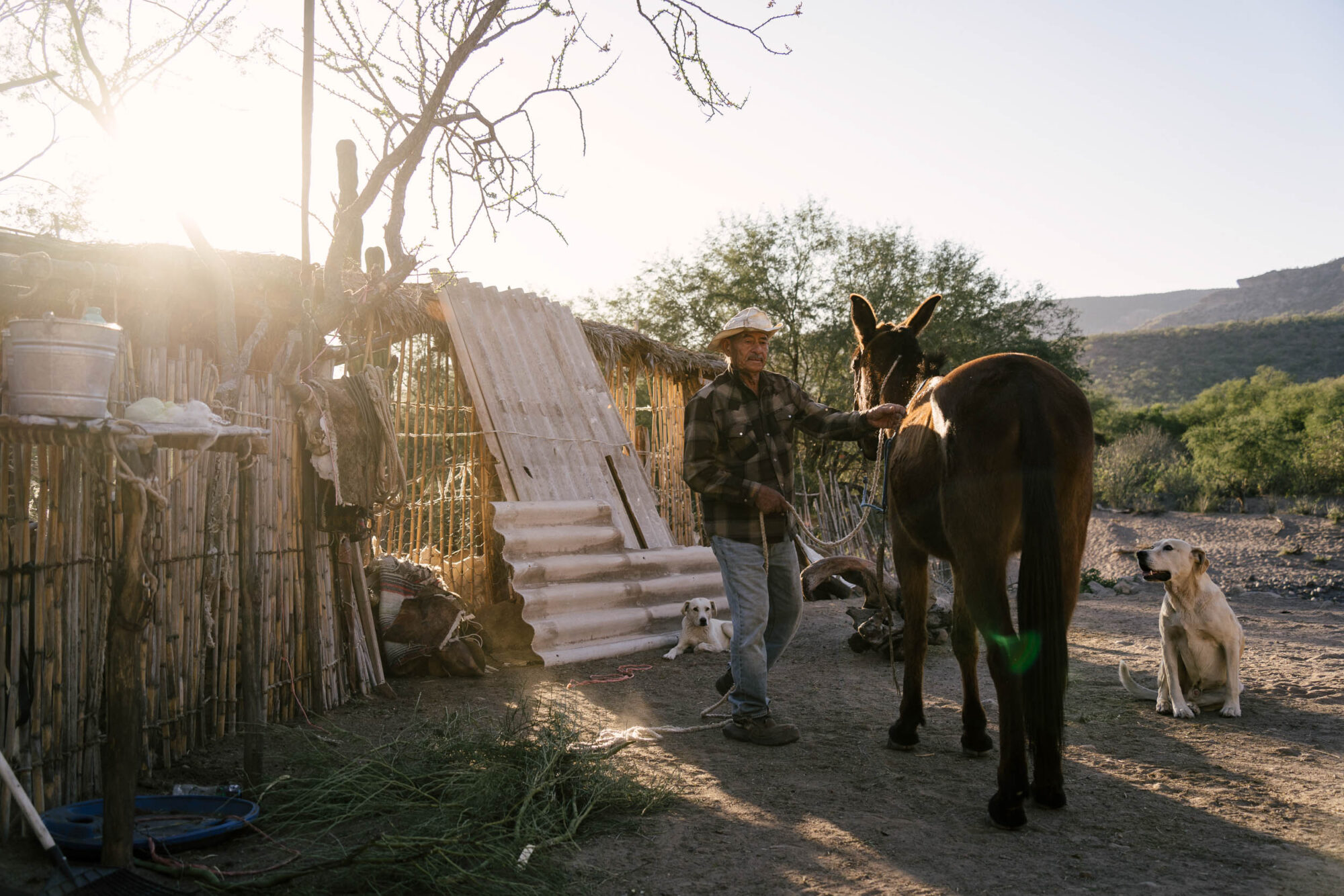
I ask what his secret is. He says down in the city, life is too hard. You have to work too hard. It burns you out. But here? They work a bit in the morning and then relax for the rest of the day. They have good, natural food and fresh air and a well full of clean water. As the two get older, they see hosting cyclists as a way to stay independent and in the canyon. They don’t want to move in with their children in La Paz, but they know the day is coming. And this year, with the spotty rain and unreliable vegetation growth, goat cheese production is down to a third of the usual amount. Cyclists can help them fill in the gaps. Carmelo points to an abandoned building on the ranch and says he’s building rooms to rent.
Carmelo and Rosalina set a sign up on the road encouraging cyclists to stay with them while passing through. They ask no set price for the dinner and breakfast we eat. They only ask for whatever we feel obliged to pay. Carmelo smiles as he hands me a cold beer after a long day, and we talk about the new fridge he just got. My middle school-level Spanish gets a little dizzy here. It was a gift? From a cyclist? But… in a car? Carmelo gives me a phone number to call, and Bo and I ride off, our shoes covered in goat poop, our hearts full from such a beautiful evening. I call the number when I get back in service and am shocked to hear a familiar voice on the other end. It’s Pam, a TV producer from Canada I met while shooting Sea Otter last year.
Wait… What?
Pam came down here to make a TV show about the Baja Divide with Christian Bagg—the owner of Bowhead—and his attempt at the Divide on his handbike. Their team came down to scout out the route before the actual ride in November and found the same pin that attracted Bo and me four months later. They stopped by to see if charging their batteries and getting hosted for the night was possible. After only two hours at the ranch, Pam felt that same blanket of charm from Carmelo and Rosalina. Pam said they were coming back in a few months and wondered if they needed anything. Carmelo responded with, “Oh, a fridge would be nice!” hoping to pay Pam to transport one through the canyon. So, off Pam went on a quest that resulted in her buying a solar panel, battery, and fridge, driving it all the way down from Canada, and then having it carried by hand over the riverbed and up the hill and finally to their home.
I’m laughing with Pam over the phone at the absurdity of the story. I tell Pam it’s being well used. It’s stocked with fresh vegetables and goat cheese and cold Coca-Cola and Tecate for the riders as they pass through. Carmelo is proud to show it off. Pam’s gift to Carmelo and Rosalina was also a gift to the bikepacking community.
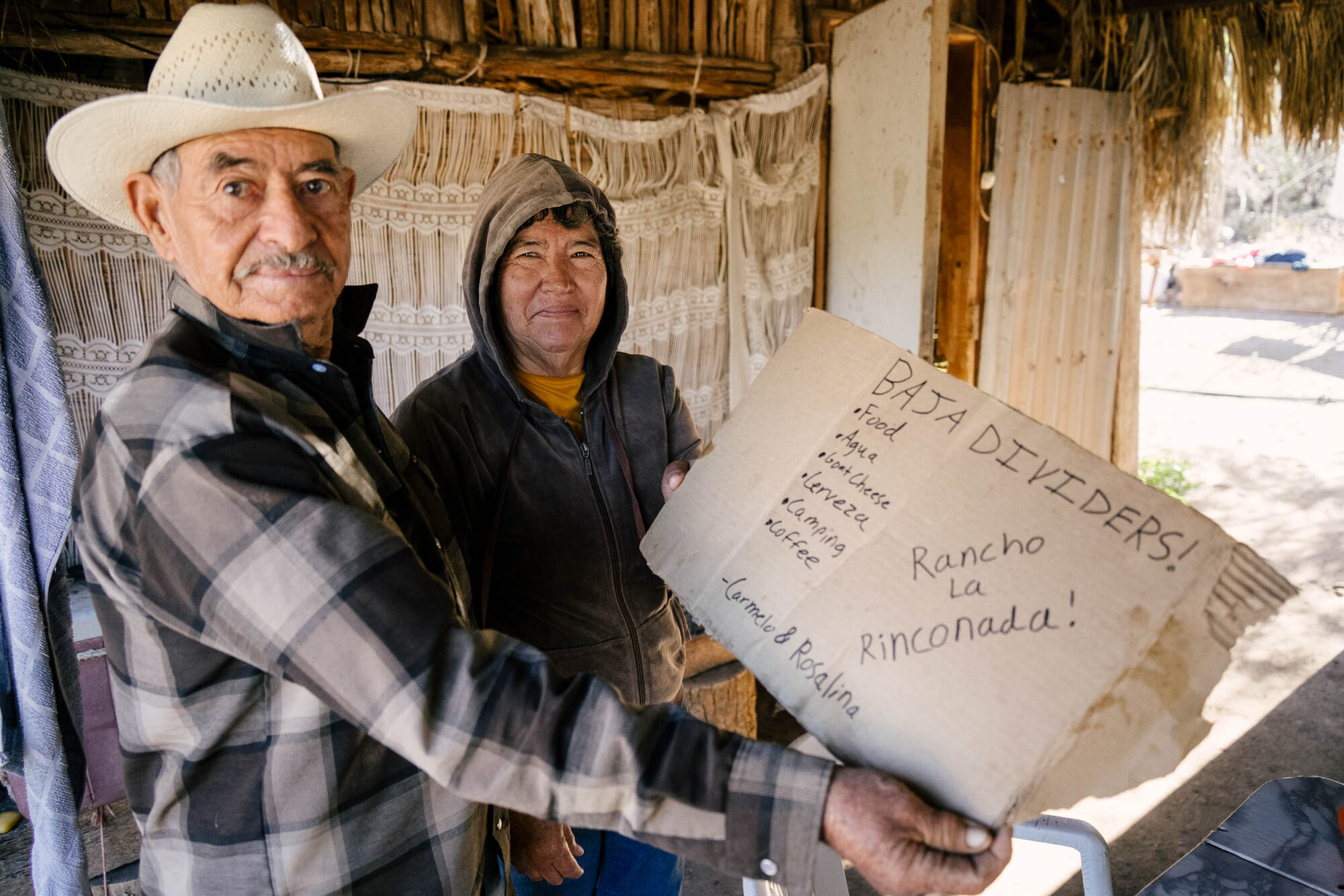
I make a new sign for Carmelo and Rosalina, and after milking the goats enough to fill a few more buckets, Bo and I push off. We ride out to the coast, meander a bit off route, and then ride further north. A couple of days from our next resupply, we stumble into another remote outpost. There’s almost nothing, only a few fishing shacks. Ten or so people. A sea of gulls overhead and some plastic bottles on the ground. It feels like there’s just nowhere left to go from here. The ocean stretches forever, and it starts just there, 20 feet away, and seems to be the only way out.
It’s so strange to think of the hundreds of cyclists who roll through this same settlement every winter and how normalized we have become to locals. I ask one, Alfredo, if we can camp, and he flicks his finger down the hill and goes back to work. I look where he points and see a small figure in motion. It’s moving fast. I pull out my binoculars and laugh, almost unsurprised to see another bikepacker heading toward us.
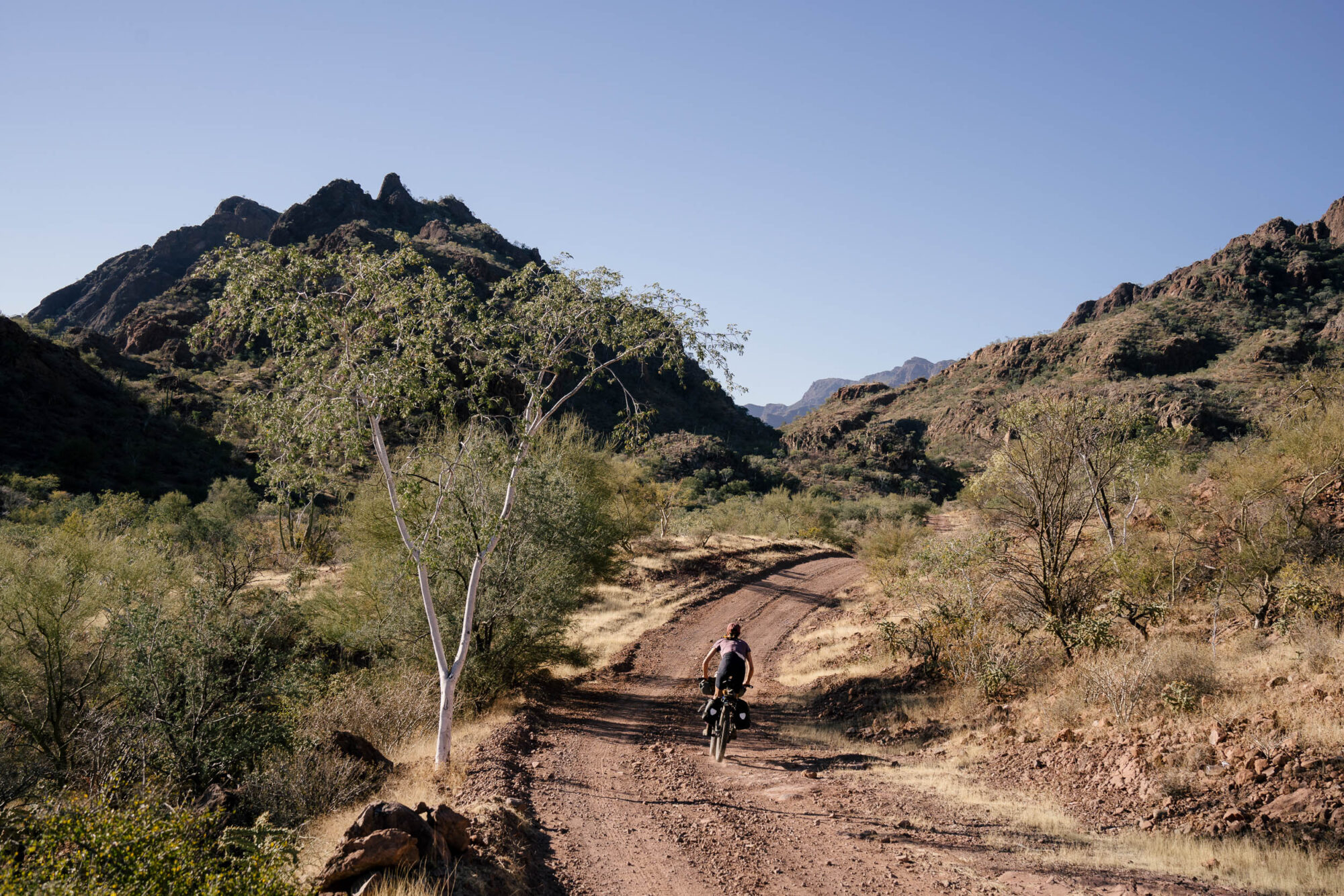
Chiron turns around to camp with us. He hasn’t seen many riders, only one other Canadian (who turned out to be his neighbor), and we push around the dunes to find a spot sheltered from the constant wind. Chiron is a mail carrier and bike mechanic back home in Vancouver, and though he’s raced bikes most of his life, he’s never taken on a big adventure like this. He’s riding his race bike with the biggest tires it will fit and carrying very little. I ask if he’s hauling anything interesting. He wrestles into his feed bag and pulls out a small glass bottle. “My dad’s ashes,” he says.
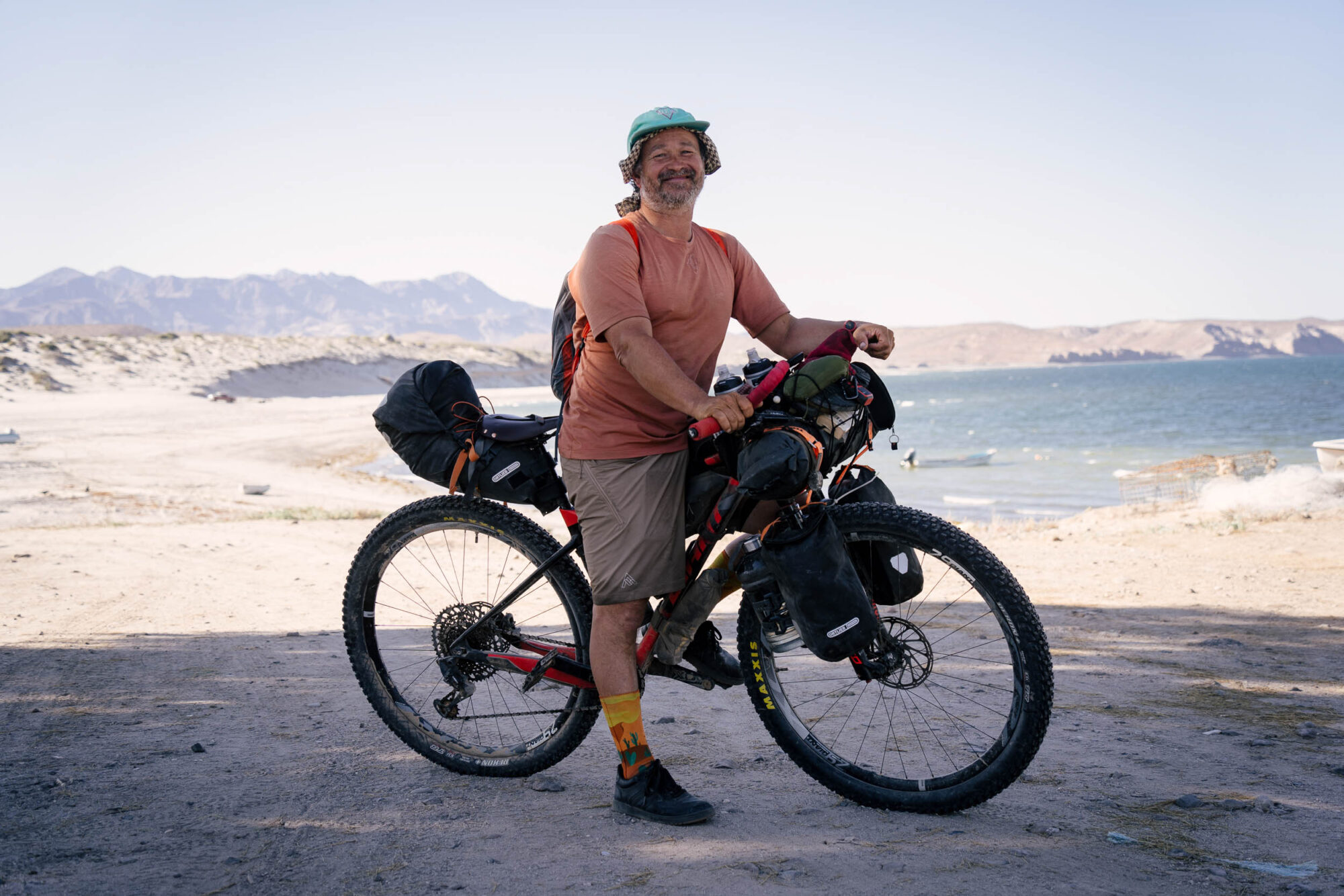
Chiron’s dad was once a drug smuggler. He ran drugs from Mexico and into Canada, and after he left that life, he bought a small farm in rural Canada and raised Chiron. They learned the language of the land together, and through this, his father left Mexico and his dark days behind. His dad died last year, and Chiron is very open about his struggles with alcoholism and depression in the ensuing months. He says it’s been going on even before his father passed, but it’s gotten worse.
He was drinking a lot and watching six hours of Netflix a day. I tip-toe with my questions and ask if I’m hunting for too much of a story here or if he’s out here riding the Baja Divide as a way to escape from the alcoholism. Chiron shoots up from folding his tent and shouts back, “Oh yeah!” Chiron is a bubbly guy. Funny and curious. He laughs with a hand on his big belly, an open mouth, and with a sort of high-pitched scream. But it serves to mask the pain. “You can’t be a piece of shit out here because literally, you’ll die!” He says life has gotten away from him back home. But out here, it’s been different. “Procrastination is not a thing out here. If I gotta pump up my tires, do it now! Fix that bag? Do it now!”
I feel happy for Chiron, both to have gotten to know him and also to see him out here using the demands of the Divide as a way to improve himself. He’s only halfway down the route, though, and I wonder how the whole ride will shake out. He’s carrying his dad’s ashes to the finish line, and he’s unsure if he’ll spread them when it’s all over. He’s carrying them more as a companion, out riding with an old friend who knew that backdoor out in case things got hairy. Chiron rides with his father not to run drugs but to run away from them. “Would your dad have ever done this?” I ask. He laughs again. “Oh, hell no!”
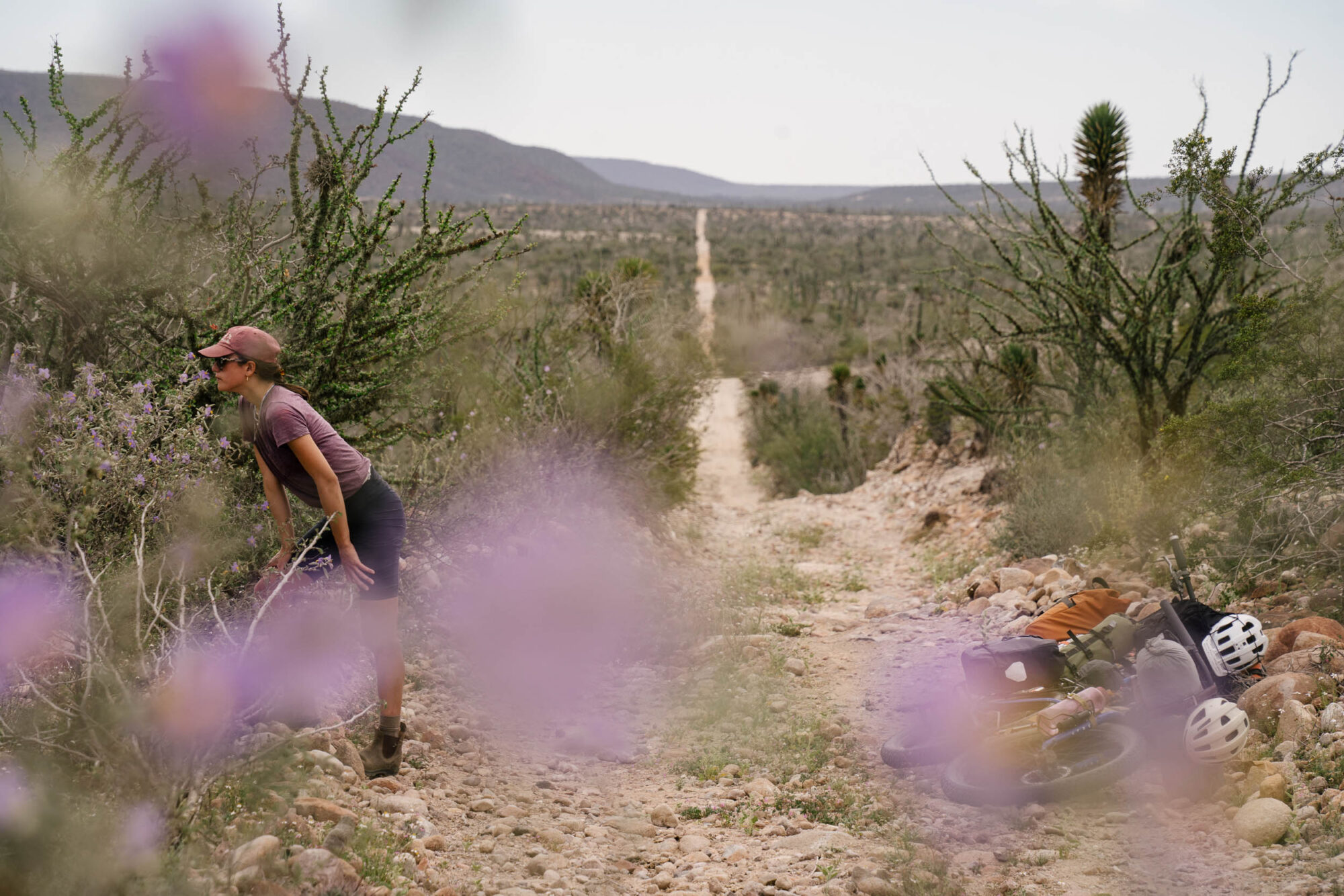
Bo and I pack up and roll up the highway into San Ignacio. As we crest the hill above the town, my bike shudders and screams, and I look down to watch the last ball bearings from my front hub crumble into the road. I push the bike into town, and while on the phone with my mechanic, Liam walks up. Some bearings have just been sent down the highway to us, and we’re stuck waiting for a couple of days. Liam lights a cigarette and pulls around his guitar. He plays us a song, a Spanish love song he’s just learned. I grumble about the four days we’ll lose, how we’ll fall behind schedule, how I wasn’t planning on staying here, and Liam just laughs. Four days is nothing. He’s bike touring from Alaska to Argentina and has been in San Ignacio for three months.
Liam comes from Australia. He studied jazz guitar in a conservatory and has played professionally for a few years. I ask if he’s traveled much. He’s taking five years for this journey, and the scale of such an endeavor always suggests long trips to work up to it. But he says not really. He went to India once but didn’t really enjoy his time there.
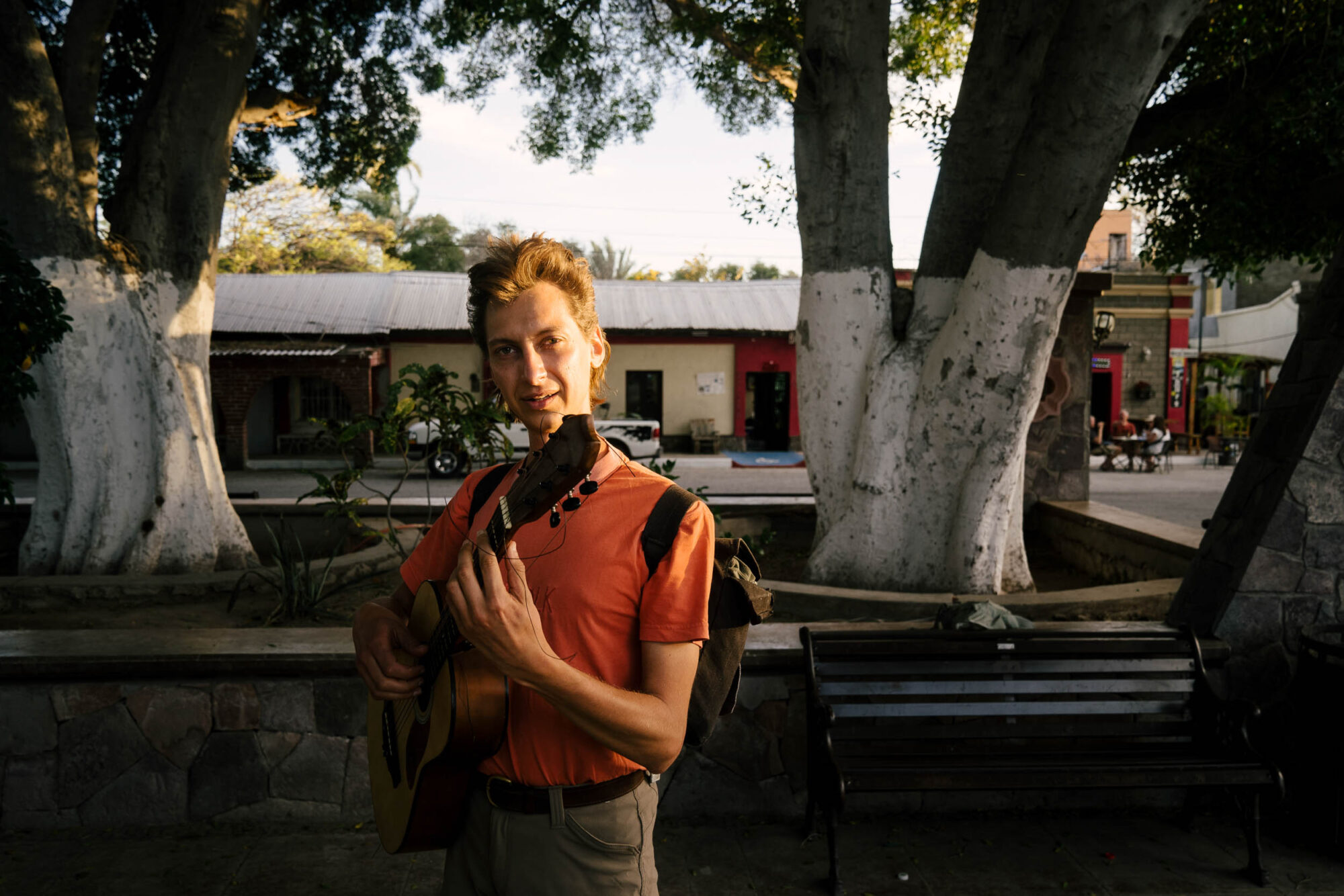
He says in school, playing an instrument for hours and hours every day, he’s learned to travel within his mind. Playing jazz has parallels to travel, and now he’s taking that same mentality of going with the flow, of following the sounds he likes, of riffing with a stranger, of the give and take of life, and bringing them out here to Mexico. He rode into San Ignacio and felt enchanted by the lagoon and the mountains in the distance and the stunning old mission that faces the main square. He made friends immediately and says he learned Spanish by just talking with the woman at the cafe for hours every day. He picked up a job waiting tables at a restaurant, and that helped too.
In just three months, Liam has nearly become fluent, and he shows me his book full of local expressions I’ve never understood. He’s made friends with the old man who plays guitar at the fancy restaurant in town and learned his new songs from him. He made friends with the town’s young people, and he invites us to a dance. We dance until three in the morning and stumble into the cafe the next day, having completely forgotten about my bearings.
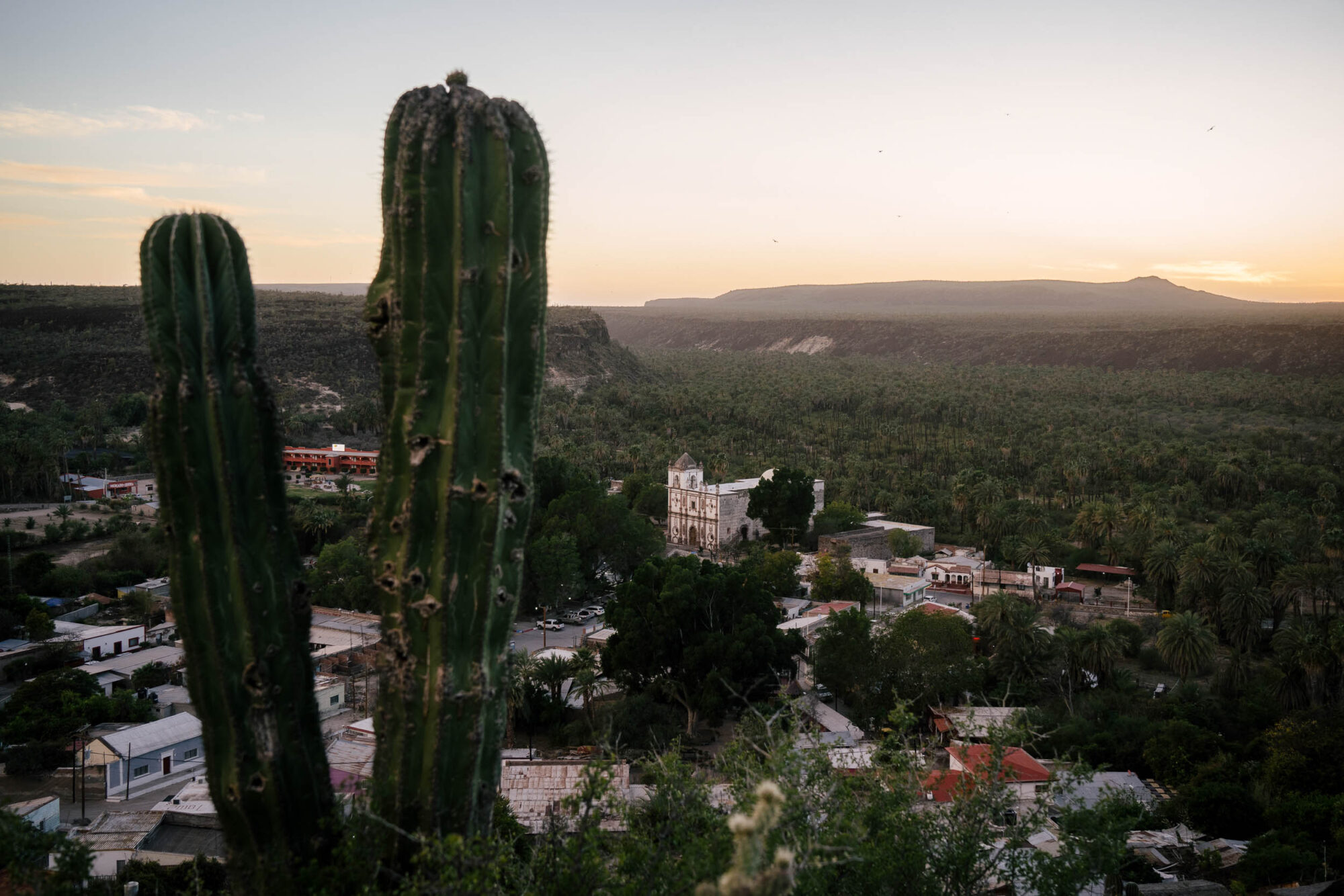
It’s a complicated web of feelings, riding this route again. Bo and I sat in the same park benches two years prior. We went to the same ice cream shop and mercado and even stayed at the same cycling hostel. But I never really appreciated San Ignacio before we returned. When we rode through two years ago, we stopped to do some laundry and resupply and pushed on to the coast. We didn’t look around. We missed the other half of town, the botanical garden near the mission, and the hiking trails up the canyon walls to see the sunset. We missed swimming in the freshwater lagoon, the fresh dates on the ground, and the full moon dances in the old mercantile.
That exploded bearing, and more importantly, Liam, pulled the brakes on our flying locomotive of a ride and made us settle down. And I felt that same enchantment that Liam feels. I could see spending two months in the cafe just talking and loving every day of it. I felt like I needed to see someone else appreciating this place first to appreciate it for myself. The locals, too, feel something similar. A kid whose father grew up in San Ignacio, José María Yazpik, went off and became a famous movie star in Mexico City. Three years ago, he returned and made a film about San Ignacio, called Polvo (slang for cocaine), using the same streets his dad grew up in, with the locals playing the background characters. Everyone I talked to mentioned the film. They talk of their cousin or uncle or selves and what scene they were in. They also found new appreciation for the place after seeing someone else do it first.
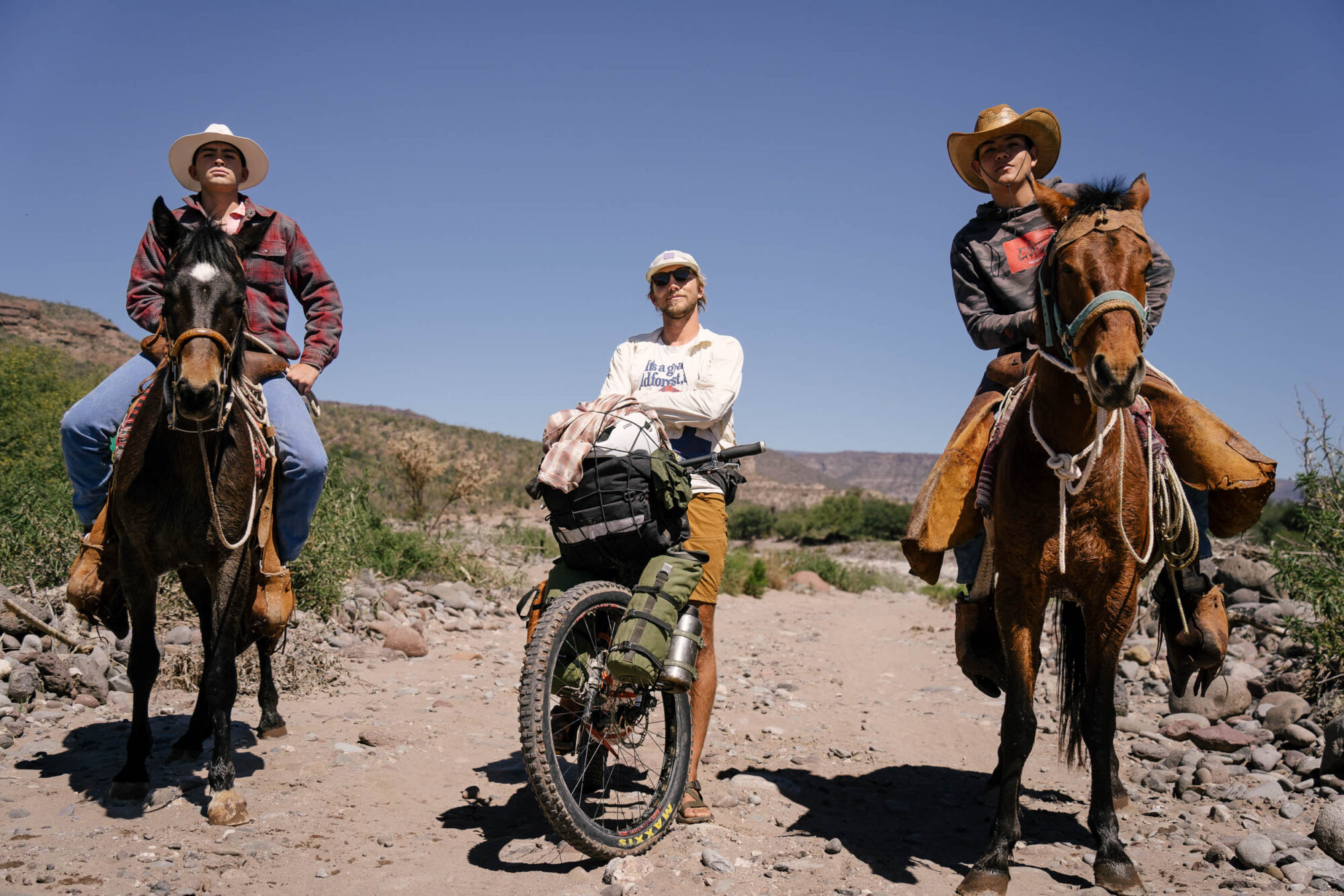
Bo and I are sitting in the main square of San Ignacio when a truck pulls up. Four doors swing open, and two dusty guys walk to the back and start unloading a pair of mountain bikes covered in panniers. I walk over and awkwardly stand around, waiting to interject and ask what’s going on. Greg hugs the truck drivers and smiles a big smile over toward me. We get to chatting under the great ficus trees that shade the square. He and his riding buddy Joe have just come back from a three-day pack mule trip into the canyons to see cave paintings. Greg’s smile once again brims with satisfaction. He seems so content with life here under the ficus trees. They, too, have spent a week in San Ignacio, and they’re having the time of their lives. “The paintings are world-class, really! I was just excited to go hiking, but mannnnn, that was incredible.”
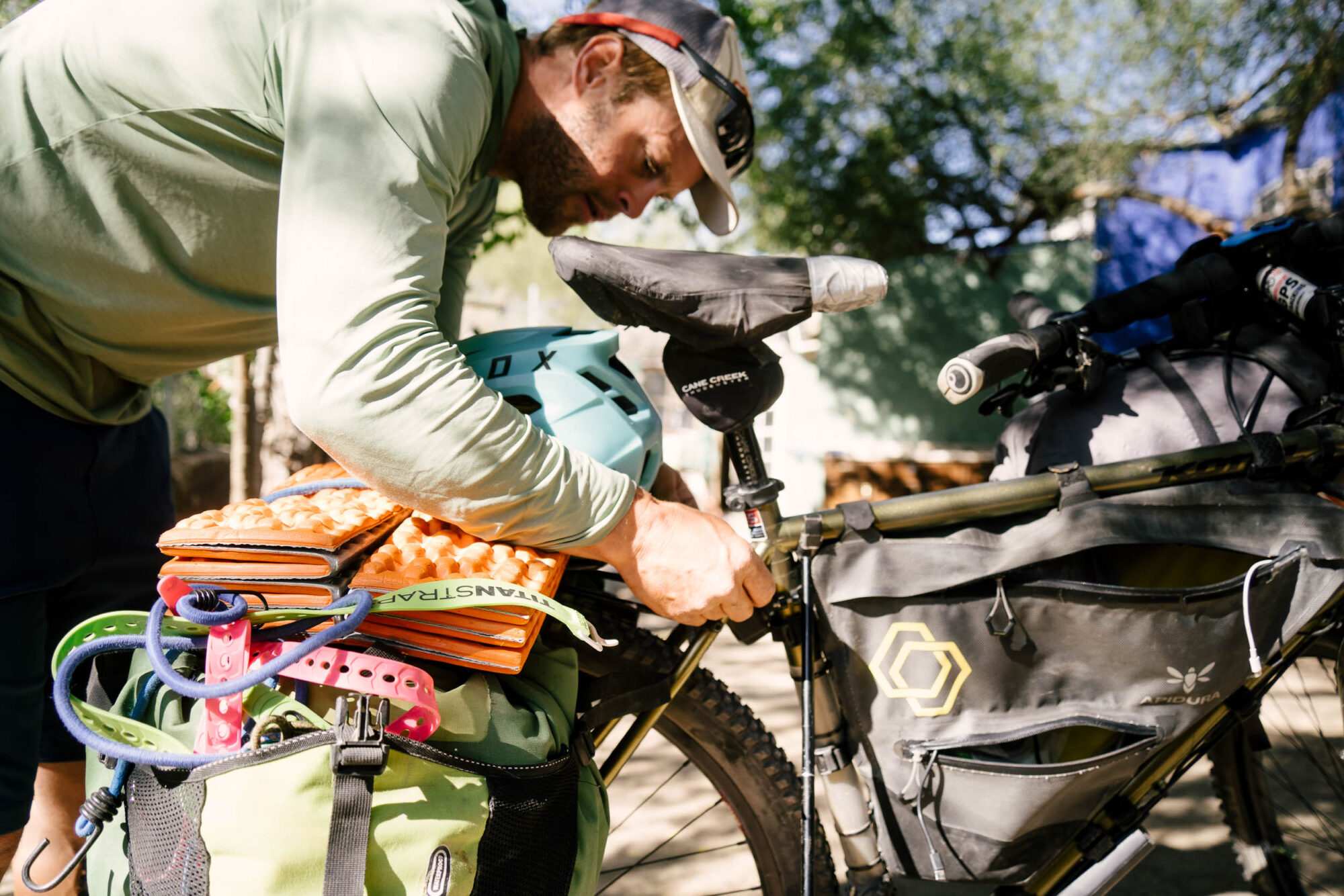
The next morning, I find Greg with a chain in his hand at the Casa de Cyclista. He’s been riding the whole route with a spare one, and he’s decided it’s time to replace it. Greg’s bike features big clunky panniers, an alarm on his bike, plastic protectors for the paint, and a pocket full of replacement bungees. He has a spare tire with him too. His anxiety about being unprepared in the wilderness has made his bike heavier, and it’s slowing him down, but it’s the thing he needs to alleviate the stress. A heavy pannier full of spare parts is his ticket to accepting the unknown of Baja.
We get to talking after the new chain is on. He focuses hard on the task at hand, but once it’s done, he opens back up. Greg talks straight. He addresses big questions head-on, and I appreciate that. I ask him how he started bikepacking, and he replies calmly with his story. “Well, it started after I left this one long, very meaningful relationship.”
Greg was diagnosed with major depressive disorder at age 11. He says he’s tried every medication since, and nothing has really helped. After that meaningful relationship crumbled and shook the earth beneath him, Greg left his job and his home and moved back in with his parents. He says being back home in his 30s, no longer functional, hit his self-esteem even harder. His mental health continued to decline. We walk down the road, and he keeps talking straight. He says he was in bed all day, helpless to escape the darkness that had taken hold of his life.
After a while, his dad started taking him out on bike rides around the neighborhood, desperate to get him out of the house. And the neighborhood rides quickly turned into town rides, and then a bit further, and a bit further, and bit by bit, Greg could finally feel moments of peace again. They still had his childhood bike in the garage, and Greg says on these short rides, he finally started to feel alive and able to be moved by moments of beauty again. He was feeling happier and better the longer he rode, and it finally dawned on him to just keep going. He bought those big green panniers and just left. He rode across the United States, making the route up as he went, covering 4,700 miles in 76 days from Washington to Massachusetts. He writes to me later, describing the journey.
“The experience radically changed my life in profound ways, as it was only on that long wandering journey that I first experienced real joy and peace and bliss in my adult life. A way of living and experiencing life that I had lost touch with since childhood and had forgotten.”
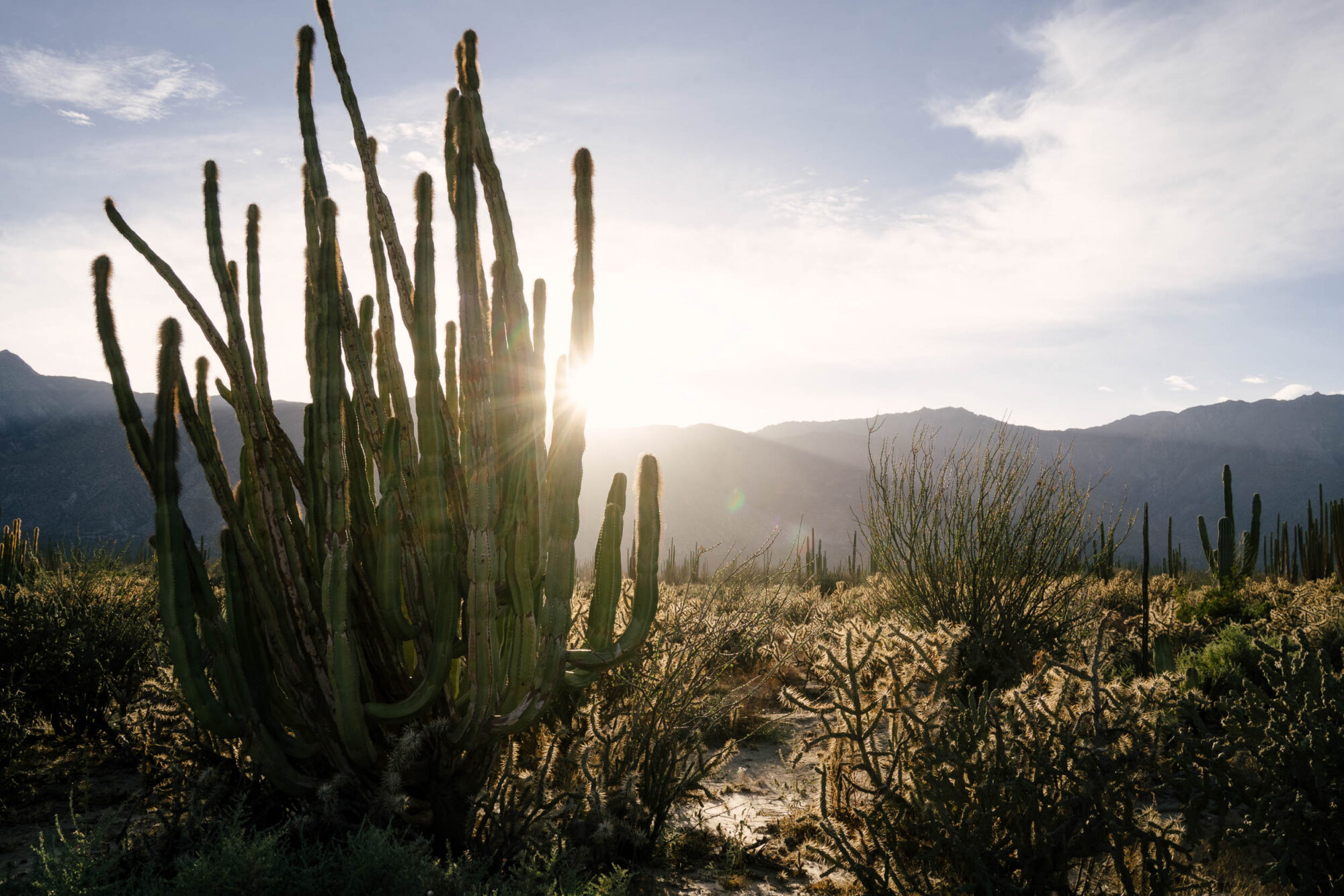
I hug Greg goodbye, and I watch him begin to pedal away, leaving San Ignacio and heading toward the coast. I imagine him on his childhood bike two years ago, burdened by sadness, looking at the same trees from his childhood, from the same saddle he’d ridden as a kid, some 20 years later. Now he’s here, headed to the mainland and further, hoping to find more peace within himself. Out here, he’s been able to let the darkness settle a bit. He still talks straight to it, as if it’s an old friend, just like he’s dragging along a shadow. But, on that bike now, with his spare tire and bungee cords, Greg moves easily over his shadow on the ground. He sits high above it and admires the world around. He takes one last look at the ficus trees, and I wave goodbye as he rides off out of view.
Related Content
Make sure to dig into these related articles for more info...
Please keep the conversation civil, constructive, and inclusive, or your comment will be removed.




